Stories of Change
My Journey on Gender influenced by the late Smita Patil
- Harish Sadani, Co-founder, MAVA
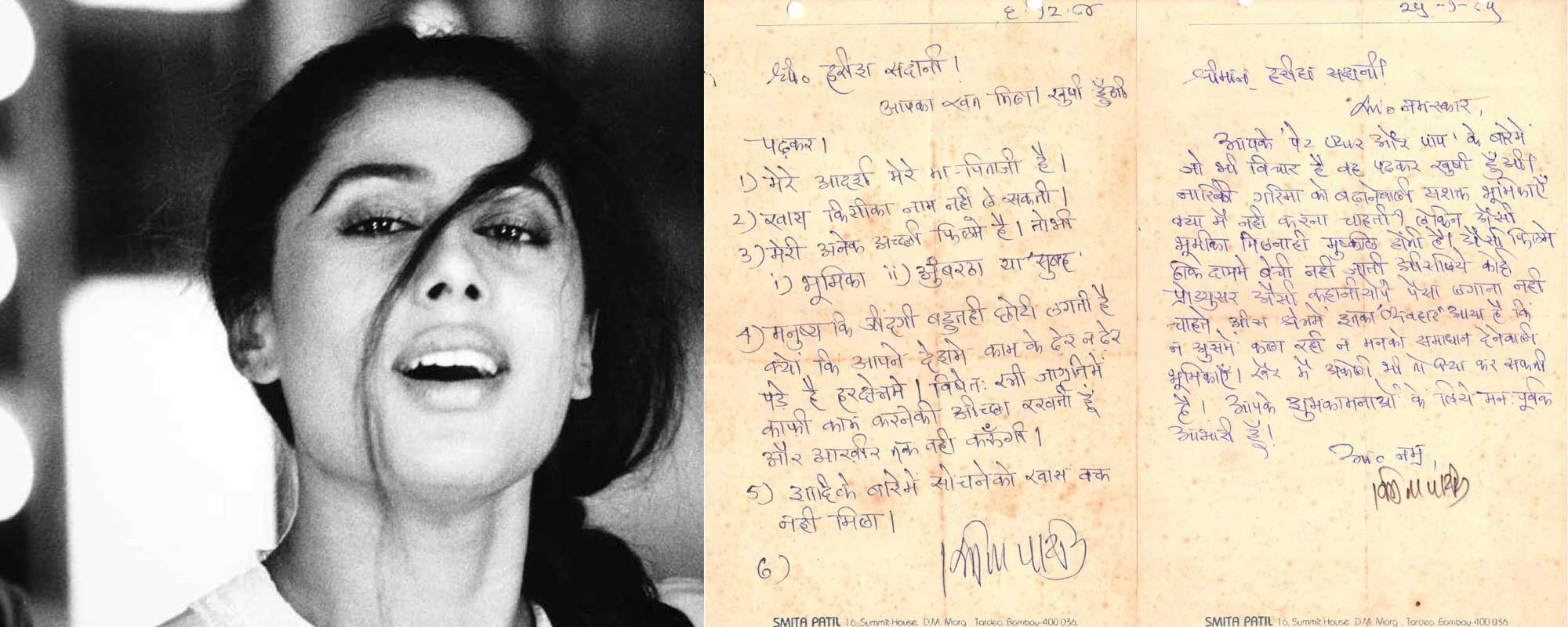
At an early age as a child, I had begun to question about gender roles. I was asking myself - Why was I teased as being a 'sissy’ or ‘girlish’ when my friends and school-classmates found me doing chores at home with paternal aunts. I remember, I felt bad and isolated then. I was wondering if it is okay if I am a growing-up man different from the men stereotyped in society. This and other questions on gender plagued me throughout my adolescence.
In my Final year of undergraduate studies in college when I was 20 years old, I was a great fan of late Smita Patil, an actress par excellence. I used to see her films, alone, in theatre houses and was highly inspired by her portrayals of woman protagonist questioning and breaking the female stereotypes - whether it was the slum-dweller in ‘Chakra’, commercial sex worker in ‘Mandi’, social activist in ‘Subah’ or the psychologically unstable woman in ‘Arth’… She had stood out as a Woman of Substance. Often, I used to weep after seeing her performing roles of an ordinary woman, struggling to live a life of dignity.
One day, I visited a book stores near my home and bought a film magazine, wherein I saw her birthdate and home address published along with those of other actors. I decided to wish her on her birthday and wrote a letter. To my pleasant surprise, I received a reply from her in her own handwriting.
Thereafter, I began to write to her regularly. She responded to my letters, where I analysed her cinema roles and she offered her own views in return. She used to take time specially to answer my questions asked in previous letters.
I was continuing my pen-friendship and watching a few of her films, while studying. On one occasion when I was watching her film ‘Nishant’, my attention got driven to the male character’s role in the film performed by the versatile actor Girish Karnad. He had played the role of a school teacher who is humble, sensitive and caring to his wife .. I was thinking as to how his character was different from the typical men expected by society.
One day I decided to share these thoughts with Smita in my letter, where I asked her why that male character was played down when he was so interesting. I was eager to know her perspective but she just shrugged off my query by merely commenting that it is the director’s prerogative on how to portray the characters. And I felt a bit disappointed.
At one moment, as there was churning in my mind on that male character, I discovered that I could connect and relate to him to my ideas of what it means to be a Man. I felt that I was living that reel character and I was not alone in my journey.
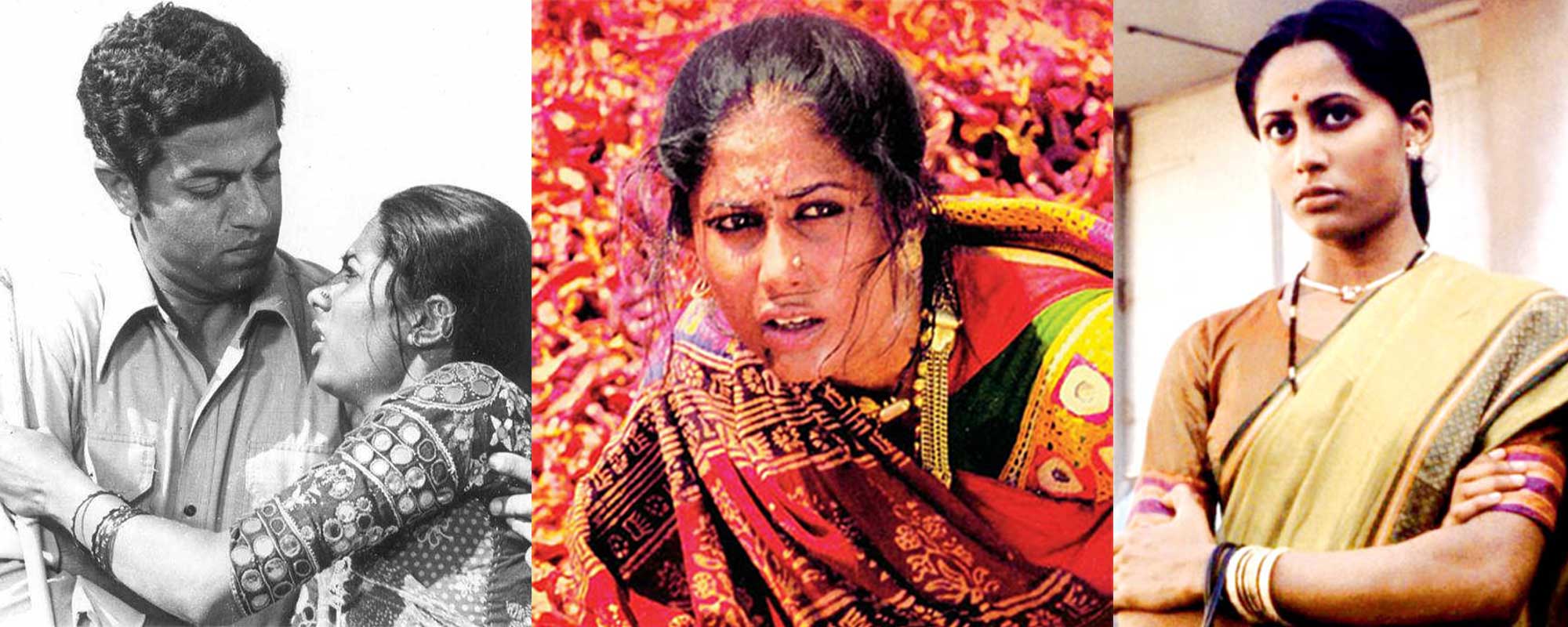
Book on the Stories of Change of 25 young men

MAVA has been, for over the past 13 years, running a 'Gender Sensitization and Mentoring' Program among young men of 18-20 years, studying in colleges in rural and urban areas of Maharashtra State. Apart from channelizing and developing leadership potential of select men under the Program, capacities of these men are tapped to enable them to be ambassadors of change, championing for women's right to safety and dignity.
A book on 25 stories of these youth champions was brought out by MAVA – one in Marathi language in 2018 (released by transgender rights activist Disha Shaikh, see in pic above) and another in English in 2020 that was released internationally in Nairobi amidst 25 global leaders who have been Aspen Institute’s New Voices Fellows.
The book, with a Foreword by eminent women’s activist Dr. Manisha Gupte, is first of its kind in India. *Foreword link
The 25 stories featured in the book have been taken from a research project painstakingly done by Researcher Roopashri Sinha and supported by Harvard University South Asian Institute and DAWN – Direct Action for Women Now Worldwide, US.
We are happy to feature here 25 stories of change among these male youth from across the 9 districts of Maharashtra, mentored at MAVA.
Story 1
Amol Kale
Traversing the journey to be a Changemaker making a difference
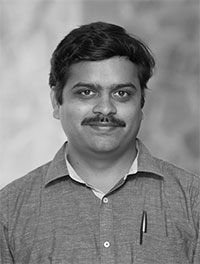 Amol joined the MAVA youth mentoring project Yuva Maitri in Pune in 2006, but much later than his other classmate friends, Sunil, and Vijay. This was because he generally did not have the time to do anything else apart from farm work and college study. He helped his mother to manage their 3-acre agricultural land and milk the cows, before and after college. His elder brother and sister lived in Pune city for their education with their father who was a rickshaw driver. Amol stayed in the village with his mother and completed graduation at the taluka-level college.
Amol joined the MAVA youth mentoring project Yuva Maitri in Pune in 2006, but much later than his other classmate friends, Sunil, and Vijay. This was because he generally did not have the time to do anything else apart from farm work and college study. He helped his mother to manage their 3-acre agricultural land and milk the cows, before and after college. His elder brother and sister lived in Pune city for their education with their father who was a rickshaw driver. Amol stayed in the village with his mother and completed graduation at the taluka-level college.
In college, Amol realized that he had missed something very important, which his friends were discussing animatedly- on topics that were closely connected to their day-to-day lives, on gender matters that were bothering them often. Having skipped an important residential training camp organized by MAVA on the subject, Amol took upon himself to catch upon the multi-dimensional aspects of gender equality by reading the materials provided by Harish Sir, discussing with friends, attending sessions organized in colleges and raising questions. Every day he was finding a new Amol within, his love and respect for his mother increased. He started putting himself in her place and understanding her viewpoint. He started pondering over whether he was really gender-sensitive? Was his behavior towards his mother and sister reflecting the change he was finding in himself?
He was able to chat with girls more freely as his burden of behaving like a typical male was fading out. He developed closeness with his younger sister and he learnt to accept that she too could have male friends and could take care of herself.
Despite his back-breaking schedule, Amol found time for MAVA activities, making wallpapers and posters on gender theme for college youth, taking sessions in colleges and conducting informal discussions with peers on a wide range of topics. He found himself discussing the same questions that had bothered him and his friends about sexuality, girls, behavior towards women and masculinity with his peers in college and village. At the same time, he was learning new skills of communication, songs, street plays, and storytelling, and gaining information on critical issues like sex-selective abortions, domestic violence, HIV/AIDS, declining sex ratio, homosexuality and the broader picture of gender inequality in India.
Amol found his mentors like Harish and friends like Raju Inamdar (Raju Inamdar is an street-theatre activist and trainer who 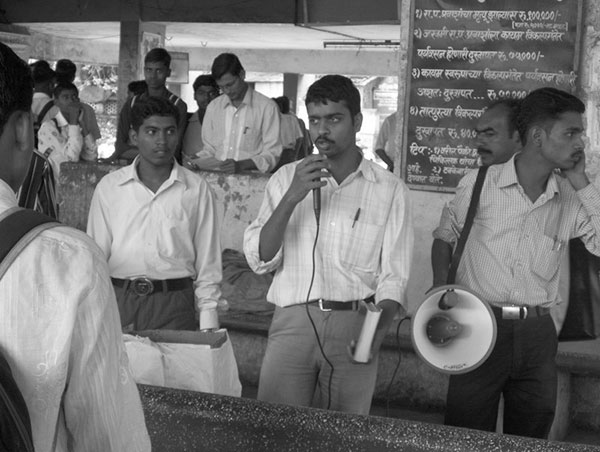 has been associated with MAVA as a Senior Mentor), met peers from groups like Rashtriya Seva Dal (Rashtriya Seva Dal, formed in 1941 by socialists to ensure justice, liberty, equality and fraternity.) and NGOs like MASUM (MASUM- Mahila Sarvangin Utkarsh Mandal, an NGO based in Pune district, works with a feminist perspective and a human rights approach to village development). He participated in a massive protest campaign against the rape of a woman in a neighbouring town, performed in street plays, especially one titled Dhokyachi Ghanta (Warning Bell) on declining sex ratio, and travelled with the “Bell Bajao campaign in select districts run by Breakthrough TV.
Amol had found his path ahead. He joined Masters in Social Work (MSW) with monetary support from some of his new found friends in MAVA and in the second year took up a job in an HIV/AIDS project to sustain himself. When he completed MSW in 2010, he got a job of training children and adolescents in sex education and gender equality. In the meantime, he continued his association with MAVA. Whenever there was an opportunity, Amol volunteered with MAVA, thus continually enriching himself and enhancing his multiple skills including leadership and team-building.
has been associated with MAVA as a Senior Mentor), met peers from groups like Rashtriya Seva Dal (Rashtriya Seva Dal, formed in 1941 by socialists to ensure justice, liberty, equality and fraternity.) and NGOs like MASUM (MASUM- Mahila Sarvangin Utkarsh Mandal, an NGO based in Pune district, works with a feminist perspective and a human rights approach to village development). He participated in a massive protest campaign against the rape of a woman in a neighbouring town, performed in street plays, especially one titled Dhokyachi Ghanta (Warning Bell) on declining sex ratio, and travelled with the “Bell Bajao campaign in select districts run by Breakthrough TV.
Amol had found his path ahead. He joined Masters in Social Work (MSW) with monetary support from some of his new found friends in MAVA and in the second year took up a job in an HIV/AIDS project to sustain himself. When he completed MSW in 2010, he got a job of training children and adolescents in sex education and gender equality. In the meantime, he continued his association with MAVA. Whenever there was an opportunity, Amol volunteered with MAVA, thus continually enriching himself and enhancing his multiple skills including leadership and team-building.
In 2015, Amol joined MAVA as the Coordinator for the YuvaTarang project in Dhule and Jalgaon districts. Under his leadership, this project has reached out to more than 300 students from several local colleges. The students are given a 2-day Orientation session, followed by a four day residential training on Gender-Perspective for a selected few. These selected students are then provided 4-day communication skills training, and 4-days of street theater training. Some of the students are now actively taking sessions in colleges with peers and also organizing street plays and awareness events at different locations. The students also formed a social media group so that they are connected to “Amol Sir” in a regular manner. Engaging conversations on so many contemporary topics were encouraged among them through WhatsApp group. Amol says “these young boys are also training me to become adept with new technologies, and be aware of new gender issues and challenges in front of us today.”
Amol though happy with his MAVA work felt torn between his family in Pune and his job which took him 300 km away. His family, consisting of his wife and four-year-old daughter missed him a lot, when Amol was away for work. Amol missed them too, especially because he could’nt contribute to the household chores and take care of his daughter, her tiffin box, studies, toys, outings. Amol says, he generally manages as many household chores as possible as he believes that makes him “an equal in the family”. He cooks, washes dishes, clothes, cleans the house, and even makes and serves tea and snacks when there are guests coming over. One of his personal goals continues to be sharing all household tasks and responsibilities equally with his wife.
While Amol’s expertise in conducting gender equality training and the ease with which he can advocate and persuade young people, remains unmatched, he feels the need to enhance his trainer skills and expand his knowledge base. For example, he speaks about his need to understand the dynamic and complex nexus between patriarchy, religion, and caste, “I am still unraveling the many layers and depths of their linkages so that I can fight it more systematically and use it in future training”. Like a true activist, Amol is a restless young man who is seeking newer ways to reach out to rural youth on gender equality.
Story 2
Suraj Ashokrao Savitabai Pawar
Freed from shackles of religious fundamentalism
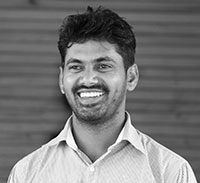 Suraj had succeeded in the competitive admission process at Tata Institute of Social Sciences and was the only male to get entry in the Women-Centred Practice Class. He was placed at MAVA for field-work exposure as a student during his first year. He found MAVA’s vision and mission unique. As a student trainee, he got exposure to all the trainings, campaigns, and mass awareness events as well as opportunity to read and enhance his knowledge and perspective. Suraj said, “After MAVA’s training my perspective towards society changed and I started finding out gender biases within and around me. I learnt that as a male in the society I have so many privileges which I can undo for shaping a gender-equal society.”
He observed the orientation and training sessions and read all the available materials at MAVA. After a few weeks, he was made a co-trainer, which turned out to be very helpful. He could learn different methods and strategies to communicate ideas on gender issues with youth from senior trainers and experts. Later on, he got several opportunities to take interactive sessions in colleges located in Mumbai, Navi Mumbai, Thane districts. The exposure to different activities of MAVA made Suraj realize that he liked being a trainer on gender issues through a two-way dialogue that enriched him immensely.
Suraj had succeeded in the competitive admission process at Tata Institute of Social Sciences and was the only male to get entry in the Women-Centred Practice Class. He was placed at MAVA for field-work exposure as a student during his first year. He found MAVA’s vision and mission unique. As a student trainee, he got exposure to all the trainings, campaigns, and mass awareness events as well as opportunity to read and enhance his knowledge and perspective. Suraj said, “After MAVA’s training my perspective towards society changed and I started finding out gender biases within and around me. I learnt that as a male in the society I have so many privileges which I can undo for shaping a gender-equal society.”
He observed the orientation and training sessions and read all the available materials at MAVA. After a few weeks, he was made a co-trainer, which turned out to be very helpful. He could learn different methods and strategies to communicate ideas on gender issues with youth from senior trainers and experts. Later on, he got several opportunities to take interactive sessions in colleges located in Mumbai, Navi Mumbai, Thane districts. The exposure to different activities of MAVA made Suraj realize that he liked being a trainer on gender issues through a two-way dialogue that enriched him immensely.
Self-reflection and Mentoring Others
For Suraj, it was not just a matter of training others on being gender sensitive but changing himself to believe and practice it. It was not easy for Suraj who came from a strict, traditional and religious family in Washim district. 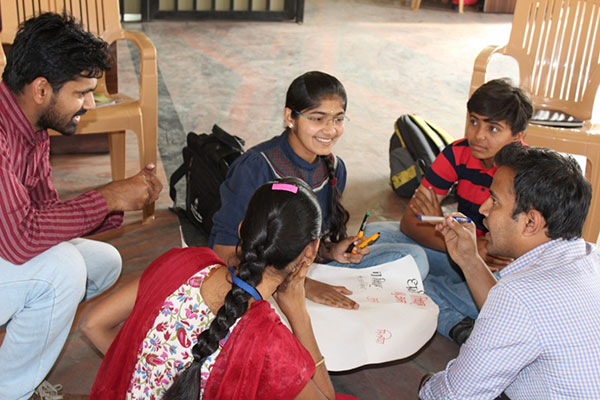 His father’s word was ‘the law’ in his family. Suraj was taught that doing good deeds and following the religious path would earn him ‘punya’. After 12th standard he was sent him to Pune to pursue a graduation in Commerce. Suraj took help from family friends to set up base in the new city. He recalls he was staying in a Hindu temple with a priest and he was expected to do all the temple chores like cleaning the place, reciting shlokas, reading religious texts, be a strict vegetarian, practice yoga, etc. In return he was paid Rs. 700 and got free lodging and boarding.
His father’s word was ‘the law’ in his family. Suraj was taught that doing good deeds and following the religious path would earn him ‘punya’. After 12th standard he was sent him to Pune to pursue a graduation in Commerce. Suraj took help from family friends to set up base in the new city. He recalls he was staying in a Hindu temple with a priest and he was expected to do all the temple chores like cleaning the place, reciting shlokas, reading religious texts, be a strict vegetarian, practice yoga, etc. In return he was paid Rs. 700 and got free lodging and boarding.
In college, during one of his meetings as a volunteer at National Service Scheme (NSS), Suraj attended a session on gender from Samyak (Samyak, is a Communication and Resource Centre on gender, masculinities, health and development) . The topic interested Suraj enough for him to join a certificate course in women’s studies at the University of Pune. This new field was like a voyage of discovery for him and more interesting than his commerce studies. For completing his graduation studies, he received a fellowship from CORO (CORO, an NGO in Mumbai provided fellowships to those aiming to work in communities) which gave him the opportunity to work in communities and groups like Samyak and Lokayat. (Lokayat, an activists group based in the city of Pune) These experiences motivated him to do post-graduation in social work. Suraj felt he had found the real path for contributing concretely to society. He convinced his conservative family that there was much scope for a career in social work and joined TISS.
Readings on dalit, women’s movements and other literature during college days gradually weaned him from the traditional Hindutva ideology which he was following. The progressive literature widened his horizons and he was able to question religious dogma and change his outlook.
After MAVA trainings, he started to communicate with his friends on sensitive issues very confidently. One of his close friends remarked, “You think more about relationships. You understand me better than earlier”. Another one said that he talks more about gender and equality now when discussing something. One of his ‘whats app’ friend commented, “You think and comment differently than others”. He has also become a role model to his younger brother and 10 year old nephew who interacts with him on any topic. Suraj feels he is able to communicate with his mother also more easily. His mother noticed and said, “You understand what is going on in my mind”. She feels he now shares and cares about her household work. His father is happy that he is taking on more family responsibilities”. His guide at TISS commented that he was showing a sharpened perspective on gender matters.
For Suraj, it has been a personal victory; to move from one end of the spectrum to the other end; from faith in the traditional religious practices to questioning and opposing patriarchy and religious norms.
Yet a long way to go
Suraj accepts that taking gender equality ahead is very difficult as there are still so many people in our society who challenge and question the very notion of equality. He feels the need to evolve some strategies to convince them. He said, “People like my father will not change because they have always lived with those beliefs...”
Suraj finds himself persistently analysing his own thoughts and actions and feels he has to change some more. He needs support from mentors, colleagues, and friends. He knows there will be frictions at home on the issue of marriage. But currently he is aiming to do his M.Phil./ PhD and join the academics. He would like to continue taking sessions with MAVA as his present job at Micro-Housing Finance Corporation gives him that freedom. As a trainer he feels he needs to prepare some modules that would be suitable for young people who have greater exposure and reading under their belt. He also feels that he could benefit from some additional inputs, interactions with experts on gender and behaviour change.
When placed with a feminist organisation doing similar gender training activities in the second year of social work training, he realised that he connected with MAVA in a distinct way. “It gave much more than just a field experience. I got a feeling of belonging to a family... of being part of MAVA... Harish Sir shares information about what is happening in the field so that I can attend various events and be updated. He invites me to conduct trainings wherever possible. Plus, the connection with Study Circles and ‘Meets’ organised by NGOs keeps me linked to newer ideas and debates in the field”.
Story 3
Sunil Chachar
From a keen learner to a trainer
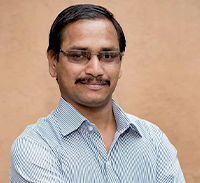 Sunil Chachar, hailing from a small village, in Pune district, believes he is a die-hard trainer, “For training, if you wake me up in the middle of the night or even when I am not well, I will be ready… any time, any group, anywhere”, says Sunil for whom, all social problems start and end with gender inequality.
Sunil Chachar, hailing from a small village, in Pune district, believes he is a die-hard trainer, “For training, if you wake me up in the middle of the night or even when I am not well, I will be ready… any time, any group, anywhere”, says Sunil for whom, all social problems start and end with gender inequality.
As a college youth, Sunil’s immediate goal was to complete his graduation and find a job. Belonging to a family that had four acres of agricultural land in drought prone Purandar taluka, Sunil was accustomed to hard work. His mother was the sole earning family member as his father had passed away when Sunil was in 4th standard. During the agricultural season, Sunil helped on the farms, and during the non-agriculture season, he used to sell mogra gajra (string of jasmine flowers). While studying in college, Sunil was active in the NSS (National Service Scheme). When one of the teachers advised him to do a brief course to learn social work skills, Sunil followed the advice sincerely. One day, he was asked to give a brief speech on a social problem. Out of the 50 students called to speak, six were selected and Sunil was one of them.
Feeling proud of this achievement, Sunil went readily for the ‘Yuva Maitri’ residential training camp in Pune organized by MAVA during 2006.
Here he was completely bowled over by both the trainers and the perspective of gender equality. Having seen his mother struggling to manage her land and the family income in an unsupportive family and village environment, he was keen on understanding gender issues and what can be done to change the scenario. He was one of the 17 college youth peer communicators who volunteered to work with MAVA.
When asked to recall something unique about his time with MAVA, Sunil said, his strongest memories are that of the trainers at the training camp. He says, “I can still recall Dr. Mohan Deshpande explaining swapna awastha (nightfall) in simple words, Milind Chavan who did a magical facilitation of the ‘power-walk game’, Dr. Anant Sathe and Mrs. Sathe explaining all the sexuality issues with so much patience”. He also recalled the ‘Tree of Patriarchy’.
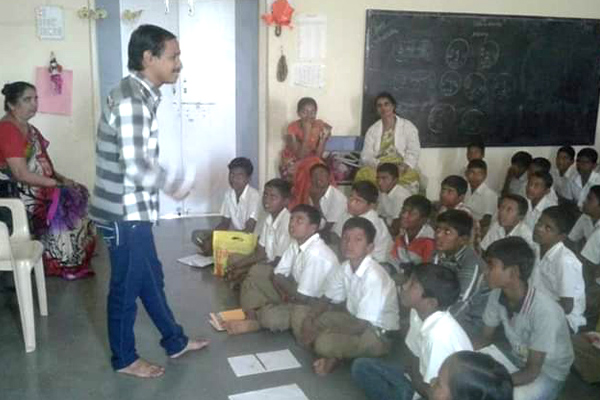 This was one of the most important lessons he learned he says, and “it is useful even today when I conduct awareness sessions because the root causes of gender inequality have not changed ...”. They were also trained in writing simple songs and street plays, singing motivational songs developed by activists. He was one of the few peer communicators who kept a diary, as advised by Harish Sir - a journal of all the takeaway messages, queries, and self- reflections from the training sessions. This is his ‘treasure box’, which he opens when he has to conduct a challenging training session, even today.
This was one of the most important lessons he learned he says, and “it is useful even today when I conduct awareness sessions because the root causes of gender inequality have not changed ...”. They were also trained in writing simple songs and street plays, singing motivational songs developed by activists. He was one of the few peer communicators who kept a diary, as advised by Harish Sir - a journal of all the takeaway messages, queries, and self- reflections from the training sessions. This is his ‘treasure box’, which he opens when he has to conduct a challenging training session, even today.
Another strong memory for Sunil is of 2007 when a group of boys from his college was going to be rusticated for teasing girls. He along with other MAVA Peer Communicators requested the Principal to allow them to work with the eve-teasers. Sunil felt this was also a “Big Test” for them. Within two months the team had succeeded in convincing the defaulting youth, to desist from misbehaving again. One of them became the top NSS cadet for the year. The college principal was impressed by their efforts and she initiated a major change. “She gave permission for boys and girls to mingle during lunch time. After that, all friends, boys, and girls, could sit together to eat our lunch box and chat on various topics freely.’’
Undertaking gender training and village development
At MAVA, Sunil was invited to be a co-trainer and he learned fast. His break as a full-fledged trainer came when Harish Sir was unable to go for a planned training session and he asked Sunil to take his place. The training was successful and Sunil has not looked back since then. He started conducting training sessions on gender for women, youth, adolescents and children through local NGOs, and educational institutions, and became quite known in the region for his clarity of thought and simple, expressive, participatory methods.
In 2010, Sunil joined Equal Communities Foundation - ECF where he was given the responsibility of working with 14-17 year old boys, on gender equality. Sunil said, “that is the age when they need this gender equality knowledge and perspective the most. When I was that age, no one told me the things I needed to learn about my body, girls and about violence and discrimination against women”.
Sunil, along with his village friend Vijay, has also set up an NGO called Manas Ekatmik Samajik Sanstha, in order to reach the rural youth who otherwise do not get to learn new perspectives, skills and think about their contribution to social change. The NGO works with women, men and children, self- help groups, yuvak mandals (youth associations), local business groups and government agencies on health, gender equality, and village development. Here again, he has his mentor, Harish Sir to thank. He helped them to get in touch with a funding agency to support their work as an NGO. Sunil adds new components to the content as per the group’s needs and their primary focus area. He uses methods that are most suitable to them. As an independent trainer, he also conducts interactive sessions for children studying in schools in his taluka on topics of sexual abuse, body awareness, health, and treating girls equally.
Sunil says, there is still so much to do. On the personal front, he is bringing up his son and daughter as equals, not a small challenge in Sunil’s rural community.
Story 4
Yogesh Kamble
Finding the path which was destined
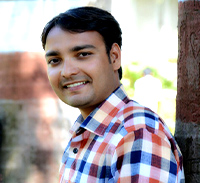 Yogesh Kamble comes from a family of teachers - his grandfather father, sister, uncles and cousins taught in local schools and colleges. When Yogesh’s father passed away, his mother who had studied up to primary school got the job as a peon in the school where his father was working. Yogesh was only 2 ½ years old at that time. His mother who had to manage all the responsibilities of the family also managed to give all of her four children, two boys, and 2 girls, a graduate-level education. This was despite the fact the high school and college were located quite far from the village.
Yogesh Kamble comes from a family of teachers - his grandfather father, sister, uncles and cousins taught in local schools and colleges. When Yogesh’s father passed away, his mother who had studied up to primary school got the job as a peon in the school where his father was working. Yogesh was only 2 ½ years old at that time. His mother who had to manage all the responsibilities of the family also managed to give all of her four children, two boys, and 2 girls, a graduate-level education. This was despite the fact the high school and college were located quite far from the village.
Yogesh though youngest, had to contribute his bit to the family income from an early age. While studying in a college in Narayangaon, he had completed an art education diploma which gave him the opportunity to teach and earn a small income. He hardly had the time or the inclination to do anything except teaching. When in 2006 he was asked by his college principal to attend a MAVA session, he was quite reluctant and skeptical. As an NSS volunteer he had no choice but be part of the brief orientation and later a week-long residential camp at Pune University. To his surprise, he was awed by the resource persons, their new ideas, and viewpoints on gender equality, legal and humanistic aspects of violence and abuse of women, and the need for social change. He had found his ‘Well’ before he was thirsty and he found himself thirsting for more.
He was excited by the ease with which speakers, resource persons spoke and the language and style of presentation at the MAVA sessions. Over the next two years, he found himself learning new skills of communication, debating, writing wallpapers, street play scripts, singing radical songs taught by cultural activists; all building his confidence in communicating. From a diffident person who had very few friends, he developed an ease with himself, with new people including girls in his new role as a MAVA mentee. They were expected to organize sessions in their own and other local colleges. He said, in the beginning, “I felt shy and unsure but then the girls and other boys came up and told us that they liked what we were doing”. The much-encouraged group went on to bring out a wallpaper called Vichar Akshari , organize essay and debate competitions, open up a question-box for college youth, and performed street plays and radio skits and interviews on youth issues, reproductive and sexual health and rights of young persons.
This peak of activities during college had to be tempered gradually after college, as doing a post-graduation was very important to Yogesh. Some of his friends had chosen social work. But, Yogesh was clear that he wanted to be a teacher and continue his family tradition. He also wanted to stay close to his mother. His two sisters were to be married and his contribution to family affairs was important.
MAVA’s Gift
The MAVA group stayed in touch with Yogesh, even as he struggled to complete his MA and B.Ed., earn by teaching at classes and help his mother in all family matters. Yogesh had several invaluable intangibles given by MAVA: a confident personality, knowledge, attitude and perspective of a forward-thinking person. He had also started communicating more openly with his mother and sister at home and friends in the village, as he had promised himself.
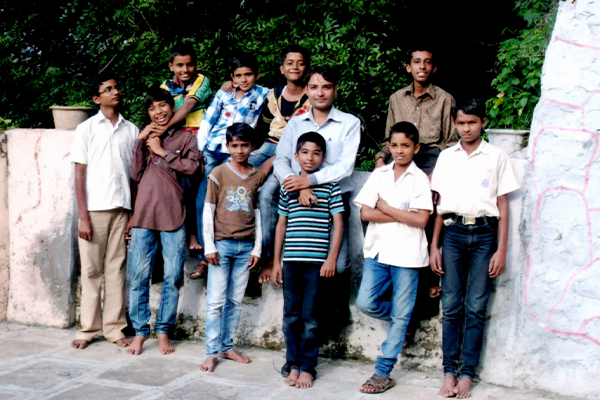 Another of his personal change plans was to share his views without inhibitions and discuss sensitive issues with friends. These changes in a shy, ‘keeping to himself’ Yogesh were noticed and welcomed by his family, neighbours and friends.
They have now become part of his personality.
Another of his personal change plans was to share his views without inhibitions and discuss sensitive issues with friends. These changes in a shy, ‘keeping to himself’ Yogesh were noticed and welcomed by his family, neighbours and friends.
They have now become part of his personality.
He says he did well in B.Ed., as he had been trained as a MAVA communicator. Later on, he completed a post-graduation degree in English Literature. Since there was a reduction in government jobs in government-run schools and colleges, Yogesh managed to get a teacher’s job in a local private school. Here, he is teaching students from 8 - 12th standard. He never misses an opportunity to discuss gender equality in his regular classes. Even while following the syllabus, he grabs every opening in the chapters, for conducting a friendly discussion on gender equality. He reviews advertisements that exploit women’s body, uses popular films, and songs to discuss gender issues. Most of his colleagues and the Principal appreciate his background with MAVA and send some of the ‘rebellious’ children for counselling.
At the junior college recently, he was able to organise a picture/ poster competition on the theme of violence against women, in which 200 posters were put up. Yogesh was happy to add the Yuva Maitri messages to the exhibition. He felt very satisfied that he could share his learning from MAVA with so many young people and visitors.
Yogesh has a very tedious daily routine. As a non-confirmed teacher at the private educational institution, he gets a paltry salary which needs to be supplemented by giving private tuitions. He starts his daily routine with tuition classes at 7.30 am. After completing his classes at 9.30 am, he travels for 45 minutes on a scooter to freshen up and pick up his tiffin box from home. He heads straight to his school–cum-junior college, where he is engaged from 11 am to 5 pm. After a short break for tea and snack, he goes on to conduct tuition classes from 5.45 to 7.00 pm and reaches home at 8.00 pm.
Despite his busy schedule, Yogesh was happy to recount his journey with MAVA, and revisit his commitment to gender equality.
Story 5
Vijay Vibhad
MAVA gave me a new vision
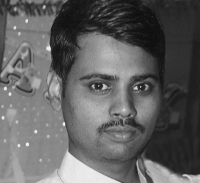 For Vijay’s family which had 3 ½ acres rain-fed agricultural land, education was a way out of poverty and caste based livelihood. His father who was a matriculate pass, owned a hair saloon in the village. Vijay and his two sisters were given higher education despite financial crises arising due to his father’s accident.
For Vijay’s family which had 3 ½ acres rain-fed agricultural land, education was a way out of poverty and caste based livelihood. His father who was a matriculate pass, owned a hair saloon in the village. Vijay and his two sisters were given higher education despite financial crises arising due to his father’s accident.
While his friends were happily participating in MAVA’s residential camp, Vijay was constantly thinking how this training was going to help him in finding a job and supporting his family. At the end of the training however, he appreciated the value of MAVA’s vision of a gender-just society and his own growth while being part of the change. The sessions and events after that initial training only kept adding to his knowledge base, skill sets, gaining a different perspective and changing his attitude towards people in general and women in particular. “All of it”, he said, “was jeevanashi nigadit, (closely linked to life). It has changed me tremendously”.
In the beginning, Vijay did not tell his family about his association with MAVA. Gradually he grew more confident and started sharing his learnings with his mother and sisters. He developed closer bonding with them. Vijay had to continue running his father’s hair saloon shop during his free time after college. So he balanced this with his MAVA commitment by keeping books, and other reading and AV materials given by MAVA at his shop. He found that a lot of people, some older than his father, had questions on sexual and reproductive health. Vijay was happy to share what he had learnt. The saloon had become a place for information sharing and informal chat sessions.
Around 2009, Vijay took the initiative to start a savings and self-help group (SHG) with his friends from the village, which proved to be very useful to many of them in times of financial emergencies. This was also a revelation to Vijay; that he could do something different by being in the development sector. That’s when he decided to take up social work as a career. His Master’s Degree in social work gave him the opportunity to work with NGOs and activists in the fields of public health, mental health, women’s rights and HIV/AIDS. He took up a job with Soudamini Network of Positive Women and Children1 which was challenging as he had grown up in a traditional environment where an educated person should only take up ‘good jobs’. Everyone in his family and friends circle asked him to refuse the job offered. But Vijay wanted to check out his personal uptake of gender equality issues from MAVA mentoring, by working with the most marginalized women’s communities.
A few years later, he got another opportunity to work in a field of his choice; with boys and on gender equality. One of his friends, who was working with Equal Communities Foundation (ECF) encouraged him to apply for a job in the same organization and he got the opportunity to mentor young boys from low-income communities in Pune.
Vijay was not only able to contribute to the organization’s modules on behavior change, but also implement new ideas in the form of community-based approach to working with boys.
Vijay is now mentoring young boys like Amol Kasbe in the same way as MAVA had mentored him, although the format is different. Amol shares that, “Vijay Sir is very friendly and explains things in detail. I find this a very good class for us boys. I help my mother in household chores, talk to girls with respect, am more focused about what I want to become in future. We learn good values, and are able to talk and discuss without fear and hesitation because we are better now informed. Vijay sir also shares some nice videos and messages on Whatsapp which I can circulate to friends. We like to see this more than reading books. My family is very happy about this class and my mother also trusts Vijay sir a lot.”
The fact that rural youth did not get opportunities to learn about the changing world and being part of it, kept nagging Vijay and his friend, Sunil Chachar. They decided to do something about it and in 2011, they set up an NGO (Manas Ekatmik Samajik Sanstha) aimed at holistic social development in villages. To begin with, they set up a crèche and a play group for children so that mothers could be free for some time in the day. They organized working parents associations, Self Help Groups for youth, men and women in the communities and conducted several training sessions on health and gender equality with women’s groups, youth and adolescents. They also worked with some corporate groups for providing training on gender equality. One of the achievements of the organization’s consistent work is that a large number of new couples in their villages have got themselves sterilized after one girl child.
Vijay continues to stick to his personal daily goals of doing household chores, taking care of children, being more communicative with his family members especially women in the house, is ready to guide any youth, friend, neighbor, who needs advice on gender and sexuality issues. All this has earned him much respect from his family, community, neighbors and peers at work. What is important for Vijay is that the ‘Shidori’2 , the packet of lessons given to him by MAVA has to be passed on.
1Soudamini Network of Positive Women and Children, Pune, is aimed at empowerment of HIV+ve women and advocacy for human rights.
2Shidori is a food package given to a person going on a long trip.
Story 6
Dhananjay Sanas
Being the Change you want to see
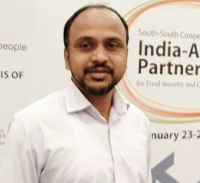 With an MSW degree from Yeshwantrao Chavan School of Social Work, Satara, in hand, Dhananjay was appointed as Coordinator for MAVA project Maanush on Gender Equality. Coming from a marginal farmer’s family, Dhananjay had worked his way through college. After studying in the village till 4th standard, Dhananjay used to walk or cycle to reach his school and junior college. Later on, his village was granted a graduation college and he could attain his bachelor’s degree in social work locally. Unfortunately, he could not continue towards a master’s degree in social work immediately as cash flow was limited in the family. His brother had joined the military after 12th class and his two sisters were married off early. Dhananjay took up a door-to-door sales job and worked on construction sites during summers for generating income. This helped him to save up some amount for post- graduation fees. Later it was supplemented by a small fellowship from a government agency.
With an MSW degree from Yeshwantrao Chavan School of Social Work, Satara, in hand, Dhananjay was appointed as Coordinator for MAVA project Maanush on Gender Equality. Coming from a marginal farmer’s family, Dhananjay had worked his way through college. After studying in the village till 4th standard, Dhananjay used to walk or cycle to reach his school and junior college. Later on, his village was granted a graduation college and he could attain his bachelor’s degree in social work locally. Unfortunately, he could not continue towards a master’s degree in social work immediately as cash flow was limited in the family. His brother had joined the military after 12th class and his two sisters were married off early. Dhananjay took up a door-to-door sales job and worked on construction sites during summers for generating income. This helped him to save up some amount for post- graduation fees. Later it was supplemented by a small fellowship from a government agency.
After completing MSW, his job hunt took him to Mumbai where he worked with different agencies. Here, Dhananjay married his longtime college girlfriend. However, marriage meant adjustment - he had to find a new job as his wife had got a good job opportunity in Sangli. He joined her aiming to find a job in the same or a neighbouring district. In 2009, one of his teachers helped him to get in touch with Shramik Janata Vikas Sanstha,an NGO that was working for comprehensive development in Satara district. The organisation had also embarked on project Maanush and Dhananjay was appointed Coordinator.
Dhananjay had to mobilize the village and college youth in Medha taluka, conduct surveys, residential camps for youth, and awareness sessions for parents and other youth in remote villages. Apart from close mentoring from Harish Sir, he got the opportunity to participate in many training sessions on gender through MAVA as it had a good network with grassroots organizations like MASUM, Stree Mukti Sanghatna1, and Tathapi2. Dhananjay gained from their strong feminist perspective. He was also guided by the MAVA mentors from Pune’s Yuva Maitri project. MAVA’s collection of reading materials on gender issues helped his perspective-building. There were also intense training sessions on developing communication skills and street plays that proved to be useful additions to his skill- set.
Due to this huge learning curve, Dhananjay facilitated a close bonding between 35 youth, who were active during the project. During the interview, he recalled how the youth came together to discuss issues like the high rate of deaths due to alcoholism which led to an oath-taking that they would shun alcohol. They also promised, not to use bad words, disrespect girls, and utilize their well-earned money for good causes rather than on religious festivals and rituals.
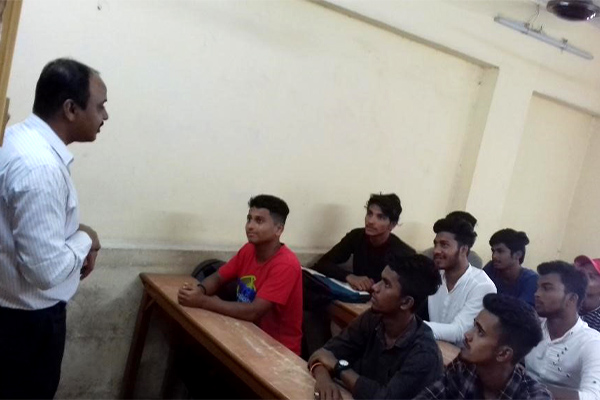 He further recalls how the group had set up a question-answer session with the local police, organized a candle march and other forms of protests against violence against women, and put up wallpapers in colleges, shops, police stations. Unfortunately, this high–energy MAVA phase had to be stopped and handed over to another coordinator as Dhananjay had to once again shift base with his family.
He further recalls how the group had set up a question-answer session with the local police, organized a candle march and other forms of protests against violence against women, and put up wallpapers in colleges, shops, police stations. Unfortunately, this high–energy MAVA phase had to be stopped and handed over to another coordinator as Dhananjay had to once again shift base with his family.
The One-Year MAVA Experience
To a question on what he had learned during his one-year MAVA work, Dhananjay said, he has always been a questioner; one who had the ‘why’ questions about traditional norms. He had stopped praying and following rituals as a youth and his practices were reaffirmed by the MAVA group of friends and mentors. His parents and family continue to be staunch believers and therefore conflicts in the family are a regular feature. However, he and his wife have now developed a strategy of letting the elders know that they respect their views but will follow only those norms they agree with. Dhananjay has a joint bank account with his wife, his property is equally divided, and all decisions are taken jointly. The couple’s attitudes and behaviours are much appreciated by his younger kin and in-laws. Some of them emulate them, some take their advice. However, some people say he does not understand anything about traditions, “he is tied to his wife’s apron”. Dhananjay does not mind them.
Reflecting on the challenge of gender equality he said, “the more challenging the issue, the more need for continuous work. Since patriarchy is closely linked to religion and traditional norms of family and society, all our efforts get foiled from so many directions”. The most difficult group, he feels is the one that pretends to have changed and changes only superficially. For Dhananjay, “change starts with a personal change as Gandhiji had stated. For this change to occur, the males have to start thinking of finding their humanity within”.
To a question about why trained mentors like him do not continue to work on gender issues, he says, it is primarily due to income-earning pressures that mentors take up jobs that come their way. There are very few NGOs who work with men on gender issues. He said, he takes MAVA along wherever he goes. Dhananjay now has a CSR (Corporate Social Responsibility) job and has guided his company’s CSR towards stronger women’s empowerment programmes like Self Help Groups, income generation activities, and gender-equal youth leadership. He has also formed a youth group in his neighbourhood where they discuss issues relating to gender. Recently when a school girl committed suicide due to sexual harassment by the boys, this youth group wrote a letter to the police authorities and built up a social media campaign.
Dhananjay’s one-year association with MAVA has snowballed into a lifetime of dedication to the cause of gender equality.
1Stree Mukti Sanghatna, NGO, works for women’s empowerment and rights
2Tathapi is a Women and Health Resource Centre partnering with local, rural and urban NGOs, responding to needs of the communities they work with.
Story 7
Sushant Prakash Kalpana Shinde
Repaying Back to Society
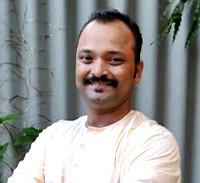 Sushant prefers not to write merely his family name. He is proud of his parents and writes their name (father and mother’s) in all of his working documents. His parents though uneducated, never said ‘NO’ to his aspirations. The only limitation was money. Born as a second son in a mathadi (head-loader) worker’s family living in Mumbai, Sushant grew up facing financial difficulties. While his father’s income was just about sufficient for day-to-day living, his brother and he took up odd jobs, like car wash, pet care, to contribute to the family’s income. Later his brother became a driver and had a substantial income to help Sushant complete his education. Sushant joined the Bombay Sarvodaya Mandal, a Gandhian NGO, where he worked for 4 years earning a small salary. This was good enough for Sushant as he had found Gandhian values more important than getting more income. To a question, why he thought differently from the other boys his age, Sushant said, “When you live in poor conditions, you see good and bad, and decide what you want to do.”
Sushant prefers not to write merely his family name. He is proud of his parents and writes their name (father and mother’s) in all of his working documents. His parents though uneducated, never said ‘NO’ to his aspirations. The only limitation was money. Born as a second son in a mathadi (head-loader) worker’s family living in Mumbai, Sushant grew up facing financial difficulties. While his father’s income was just about sufficient for day-to-day living, his brother and he took up odd jobs, like car wash, pet care, to contribute to the family’s income. Later his brother became a driver and had a substantial income to help Sushant complete his education. Sushant joined the Bombay Sarvodaya Mandal, a Gandhian NGO, where he worked for 4 years earning a small salary. This was good enough for Sushant as he had found Gandhian values more important than getting more income. To a question, why he thought differently from the other boys his age, Sushant said, “When you live in poor conditions, you see good and bad, and decide what you want to do.”
He recalls how despite having his name on the selected candidates’ lists for two different diplomas courses, he could not join for lack of money. He remembers how as the last option, he had gone to R.M. Bhat School in the neigbourhood, hoping to get his name enrolled for class XI. His mother had given him Rs. 150 for admission. After spending Rs. 100 for admission form, he had very little money left for fees (Rs. 225). Birje Madam, from the administration section of the school, who had seen him waiting from morning to evening, trying to find a way out, had offered him the money to pay the fees and complete his college admission process. That readiness to help was a value much appreciated by young Sushant.
He worked during the day and attended a Night College and completed his graduation. Here he was introduced to National Service Scheme (NSS) and he learnt about the different kinds of social service. He also got to meet Harish Sir and know about MAVA. This was his first exposure to the concept of gender equality. He later attended the five day residential camp where for the first time he gave thought to questions like “who is he as a person, his body, his sexuality, how he views women, how we are socialized and the impact of media. What I know today and use in my work is all from MAVA.”
Finding a mentor and becoming a mentor
He loved the way Harish Sir would sit down for discussing topics. These were real, practical topics like, “why should a girl always return home before its dark. Why do we send a younger boy along with a girl if she is going out in the dark or to a shop? What makes us believe that men will always be saviours for women? Do we really believe that men are solely responsible for the family and women do not play any role? ’’ I suddenly found answers to so many questions through those informal chats.
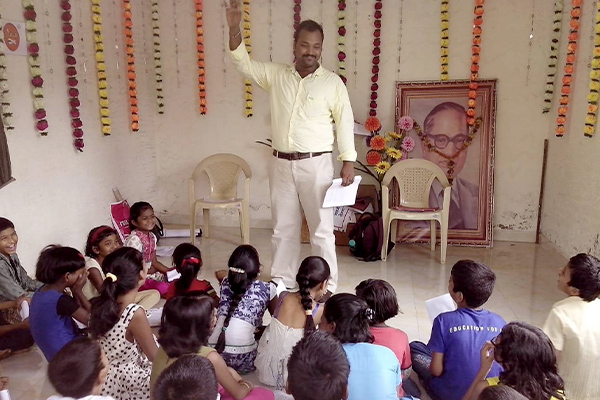 After that MAVA camp, I started washing my own food plate and tiffin box. My perspective about girls changed. I developed greater sensitivity and respect towards them. I realized that there are small things that one can start doing for treating women in our lives with respect and equality. These ideas have stayed with me and these are my learnings for life.”
After that MAVA camp, I started washing my own food plate and tiffin box. My perspective about girls changed. I developed greater sensitivity and respect towards them. I realized that there are small things that one can start doing for treating women in our lives with respect and equality. These ideas have stayed with me and these are my learnings for life.”
It was Harish Sir who advised him to do Masters in Social Work. He got admission in Nirmala Niketan’s College of Social Work, Mumbai and found a career that much suited him. Even as a social work student, he found that some of his male colleagues needed to be advised about how to behave with and around girls. He recalled how when they had to do field work in Raigad, which required staying for 2 days with the girl students, he was able to provide a comfortable environment for them due to his behavior. He guided his male classmate to be sensitive to the fact that if he comes out of the traditional patriarchal framework towards girl peers, they could all become good friends and supportive to each other.
Sushant says he has not mentored people in a big way like Harish Sir. But he has been able to guide some peers, friends, colleagues, through his one-to-one conversations about changing their perspective of women. For Sushant “even if he convinces one male to become gender sensitive he would have achieved something”. He continues to wash his utensils after dinner and does his “small bit” to help his mother. When he cleans his tiffin box in office, his colleagues (95% being women) find it very refreshing. His job as the Coordinator at ARPAN, an NGO working on the issue of child sexual abuse gives him sufficient space to integrate gender equality in the child sexual abuse modules for school children. He weaves in discussion on myths about our bodies and sexuality, about abuse, violence and disrespect of one’s own and others’ bodies. He feels gender issues should be ideally taught to school children; after that age, many ideas get ‘concretized’ in the boys minds and it is very difficult to change them.
Sushant’s personal change plan as per his narration has been “Due to MAVA I have become a sensitive person and I would like to remain so all my life.” he adds, “I know I have a certain softness that can make people especially women around me feel comfortable, to express and share and I would like to continue to be that kind of male.”
Story 8
Sumit Jagtap
Looking at the world through gender lens
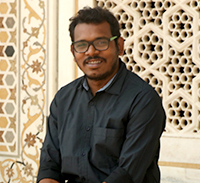 Born and brought up in a middle-class suburb in Mumbai, Sumit’s exposure to radical ideas due to his social work education is like a building block to his extra-curricular social activities in school and NSS activities in junior college. He put his whole heart whether it was shramdaan (voluntary work) or working at the leprosy hospital near Mumbai. He was an active student representative with a readiness to initiate changes from his level. Knowing his penchant for community work, his mentor in college guided him in taking up the less known graduation in social work education as she herself was doing it. While studying for his Bachelor’s degree in Social Work (BSW) in Mumbai, Rahul excelled as an organizer, presenter and mentor. He was a Special Cell representative at the university level.
Born and brought up in a middle-class suburb in Mumbai, Sumit’s exposure to radical ideas due to his social work education is like a building block to his extra-curricular social activities in school and NSS activities in junior college. He put his whole heart whether it was shramdaan (voluntary work) or working at the leprosy hospital near Mumbai. He was an active student representative with a readiness to initiate changes from his level. Knowing his penchant for community work, his mentor in college guided him in taking up the less known graduation in social work education as she herself was doing it. While studying for his Bachelor’s degree in Social Work (BSW) in Mumbai, Rahul excelled as an organizer, presenter and mentor. He was a Special Cell representative at the university level.
Sumit was introduced to MAVA when he was placed for field work with organisations where he met activists who were working on the issues of gender, caste, tribe and sustainable development. They all spoke highly of MAVA. Sumit was himself impressed by the stated objectives and goals of the organization, and he volunteered to be part of MAVA trainings. As a MAVA volunteer, he got an opportunity to attend some of the training programmes for college youth. He said, his takeaway from the training programmes, was “a better understanding of self, on what it means to be a male in our society, the privileges he enjoys and to be rational enough to say no to them”. He also began to reflect on the objectification of women in films, advertisements and how gender discrimination takes place in all institutions of socialization, including religion. He said, earlier as a young man he was like any other boy who would look at a girl and pass comments, focus only on some body parts and call them ‘Item’ or Cheez (thing). He was very much part of the culture of seeing women as objects for sexual gratification. He recalls how he found himself questioning the way in which boys are groomed in so many ways, over so many years, in subtle as well as open ways to become ‘masculine’, or the khara mard (the ‘real male’). He said “gender discrimination is so much part of our mindset”, that it cannot but be a difficult and long-drawn struggle. He became clearer on the role to be played by men in changing the lower status of women and discrimination against them.
As a trainee social worker, he was studying the theoretical understanding of gender issues;, which was supplemented by his work with MAVA. The latter helped him to “develop a feminist perspective towards society”. MAVA put in him a “gender keeda” (a worm called gender) which made him question everything from the gender angle. He found the training discursive, self-reflective, interactive and easy to understand. The practical application of feminist theory was especially useful for Rahul. He recalls, “It was an amazing experience to work with one of the India’s first men’s organization that works on gender sensitization and on gender based violence. I got an opportunity to get connected with the college youth as well as slum children and made them understand how gender works as a system”.
Applying Theory
Sumit learnt the method of organizing gender-sensitization sessions in different colleges in Mumbai. He found most participating students were curious and eager to learn. One of the favourite topics for the students at that time was sexuality, lesbian, gay, bisexual, transgender, transsexual, queers (LGBTQs); another was about religion and traditional norms. Some were more attentive and participating than others. He learnt the training method of asking rhethorical questions and speak with ease in the same language as young people use, of posing sensitive, generally unasked questions, challenging traditional norms through discussions. He feels happy that some of the participant youths continue to see him as a mentor and interact with him on social media networks and are now keen to join social work colleges.
With MAVA, he got the chance to participate in the several campaigns on gender equality, raising issues of rape and sexual harassment and spread ideas of gender equality among the masses. The use of street-plays, puppetry and songs helped him to find new skills, learn to utilize his hidden potential and connect with people on an important issue. He found the articles written in MAVA’s annual men’s magazine, PurushSpandana and the films shown at MAVA’s Film festivals were inspiring. As a volunteer, he also undertook a mini research study on the perspective of college students on gender equality, which reiterated the strong need for working on changing attitudes and behaviours of male youths.
On the personal front, Sumit started understanding the role and importance of women in his family rather than taking them granted. He has become more sensitive to his mother’s workload, her viewpoints, decisions and hassles. Some of his friends are happy that he has changed his perspective towards women, although there are a few who “are just not able to understand what he is saying”. Sometimes when he is with them chilling out, he is asked to comment on passing girls. He says he tells them in ‘a cool tone’ that he would prefer to understand the person rather than just look at her body. To that, some agree and some don’t.
His volunteering with MAVA has showed him a pathway to work towards gender equality in society as a concerned citizen, to hone his personal perspective and challenge his own behaviour and to find linkages of gender with different aspects of development as a professional social worker.
Story 9
Umesh Jamuna Kaniram Rathod
Sex-Education should be provided to every growing-up child
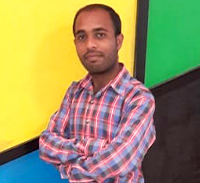 Umesh belongs to an agricultural family of 8 members, with 5 children. It owns 4 acres of land where they grow cotton and soyabean. The two elder sisters were married after they turned 18. One of his brothers is a gram sevak (government recognized village social worker). Since his uncle is a trained social worker ( done his MSW), Umesh thought of doing social work training as he can get a decent job as well as work for the welfare of his society.
Umesh belongs to an agricultural family of 8 members, with 5 children. It owns 4 acres of land where they grow cotton and soyabean. The two elder sisters were married after they turned 18. One of his brothers is a gram sevak (government recognized village social worker). Since his uncle is a trained social worker ( done his MSW), Umesh thought of doing social work training as he can get a decent job as well as work for the welfare of his society.
About Training
About his perspective-development on gender, Umesh writes, “I had never received information on gender equality in such an interesting manner, through games, entertaining activities, and so I understood all the things fast. I learned about the physical changes occurring in boys and girls as we grow up and the way in which the male body functions. I also got to know about health issues that can prove to be very useful. I learned about male-female equality, to treat women with respect and as equals”.
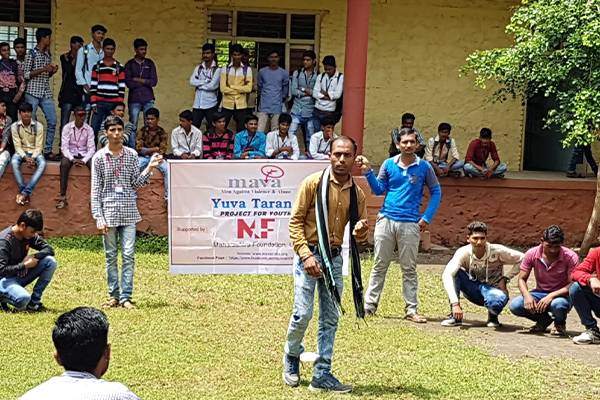 Umesh said, their group tried performing a street play on HIV/AIDS. After that they were given a four-day communication skills training and later on a 4-day street play training. They also received a booklet “Hey sare mala maahit havey”(I should know all this) which has complete scientific information on sexuality.
Umesh said, their group tried performing a street play on HIV/AIDS. After that they were given a four-day communication skills training and later on a 4-day street play training. They also received a booklet “Hey sare mala maahit havey”(I should know all this) which has complete scientific information on sexuality.
Post training
Umesh, then staying in a hostel near college (in town) for his studies, says, “I am now able to communicate with some close friends at the hostel about what I learnt at MAVA. I shared whatever I had learnt. I am sure I will be able to do more later on. Since our teachers are also involved in MAVA programme, it is easy to take this ahead in our college now.”
Discussing about general problems found in his village, Umesh said, “the main problems in our area are less education for girls and marriage as soon as they are in the 17-18th year of age. The other major problem is belief in traditions and health issues. What we need is sex education as well as gender sensitivity and gender equality in all our schools and colleges. Only that will change our society which is very backward. I would like to work with MAVA and do awareness- generation on this issue. I will also change my own ideas about girls and women henceforth. After training, I have started using my mother’s name as I am proud of my mother. I am studying only because of her efforts and she deserves to be part of my name, my identity.’’
When interviewed, Umesh was packing to attend the street play workshop for four days. He was excited because he believed like other MAVA programmes there will be a lot to gain and share with peers.
Story 10
Amit Parihar
Championing the Cause of Gender Equality through Plays and Films
 As a growing village teenager who got very little exposure to the outside world, Amit had watched with great interest the street plays on gender-discrimination, that were performed during Ganapati festival in his village. He met Mayur, the coordinator of Maanush project, when he was studying in First Year Bachelors in Arts and got an inkling of what some of the senior boys in his village were doing; meeting in small groups, discussing with some outsiders, and performing plays.
As a growing village teenager who got very little exposure to the outside world, Amit had watched with great interest the street plays on gender-discrimination, that were performed during Ganapati festival in his village. He met Mayur, the coordinator of Maanush project, when he was studying in First Year Bachelors in Arts and got an inkling of what some of the senior boys in his village were doing; meeting in small groups, discussing with some outsiders, and performing plays.
He was one of the 25 rural youth selected from the NSS unit of different colleges in Satara, who participated in the 4-day MAVA camp. He recalled how he was excited about the first camp as he thought he would get to see some new places and make new friends. He learnt much more than he expected. For the first time, he saw a non-lecture kind of training. He eagerly took part in the interactive sessions, played games, and watched “very different kinds of films”. The question-answer and small group discussion sessions made him examine the double standards placed on girls in his area and how they have to prove that they are ‘good girls’, whereas boys get all the freedoms and privileges. The boys can behave badly and no one will question them.
As a growing child he had observed that women generally faced many problems, especially abusive language, harassment and violence. His cousin sister was married to a man who was an alcoholic and he would beat her ruthlessly. No one would question him. Amit realized that this was a crucial issue in society and he wanted to do something about it. MAVA’s several discussions touched his heart.
What Amit cherished most at MAVA’s events was the close bond he had formed with all the other boys. There were new thoughts churning in his head. He could not wait to share his new found perspective with his village and college friends. He started discussing with them about girlfriends, marriage, working women, women wearing non- traditional clothes of their choice, girls with boyfriends, etc. Amit soon realized that some boys were ready to change while some needed more persuasion.
He shared about an incident, when he had gone to Goa for a picnic with his college friends, boys and girls. One day one of the girls left the group and went sight-seeing with a new found friend. All the friends got upset. They started to scold her and call her names. Amit intervened by saying that she is an adult and has every right to decide about her life, just like boys like to decide. He prodded them to think, “When boys can go out with different girls why can’t girls do the same, why should they be labelled”. His arguments convinced all his friends. They respected him for making them understand in such a “nice way”. The concerned girl also understood that she should have taken her friends into confidence and stood up for her decision.
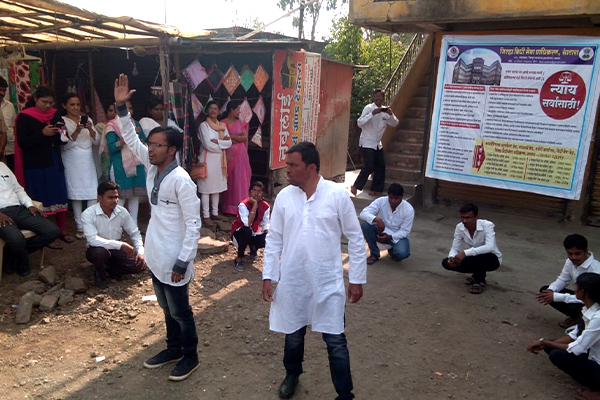 Amit also recalled how he has seen college-mates tease girls standing at the bus stop, or walking on the road. And he could not stop them. This incident became one of the major reasons that Amit started exploring the medium of street plays as it could help to discuss male behaviours that are hard to change. The street play workshop had opened a new space for Amit. He was involved in the writing of a street play on gender and HIV/ AIDS, which was later on performed in different parts of Maharashtra. This made him realize the power of media to question traditional norms and present new thoughts. Amit had found his sphere of control.
Amit also recalled how he has seen college-mates tease girls standing at the bus stop, or walking on the road. And he could not stop them. This incident became one of the major reasons that Amit started exploring the medium of street plays as it could help to discuss male behaviours that are hard to change. The street play workshop had opened a new space for Amit. He was involved in the writing of a street play on gender and HIV/ AIDS, which was later on performed in different parts of Maharashtra. This made him realize the power of media to question traditional norms and present new thoughts. Amit had found his sphere of control.
Taking on media campaigning
Amit was active with MAVA till 2014 on a number of street play campaigns on gender equality. After that Amit shared his fascination for street plays with a group of 15-16 youths from the villages in Javli taluka. They stayed in touch through mobile phones. They worked with him for organizing street plays during Ganapati and Durga puja festivals. Amit also found that there are many youth groups who wanted to do awareness generation in their neighbourhoods. He started helping these youth groups to organize street plays on gender problems by giving them the MAVA perspective. He continues to meet experts and friends from MAVA and takes their guidance while writing on any topical issue related to gender. He also uses media reports, google search and YouTube for getting details on new topics.
In 2015-16, Amit participated in a state level theater competition. He also organized a professional play on a gender issue. He has been trying his hand at writing and directing short films. He feels gender questions are not raised in mainstream films and he would like to write gender-based film scripts and also direct films at some point of time.
He believes some young people want to change but they need more support from a circle of friends and like-minded people. He said, “see one of my cousins has two daughters and he has operated despite pressure from my grandmother. Young people want to change and they are ready to make small changes in their lives. They will not make major changes as they afraid of what people will say. Only when there is a support group, they will defy people and fight them openly. Therefore social change at the grassroots level is important”.
Amit has always welcomed any interaction with Harish Sir and is ready to meet him anywhere, anytime, as they refresh his thoughts and resolve.
Story 11
Abhijeet Meena Ramesh Chavan
Aspiring to reach out to peers through Animation
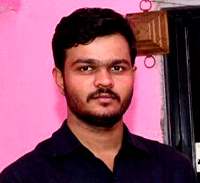 21 year old Abhijeet is presently occupied with two things – doing his masters in sociology and completing an advanced course in animation. The first one is to keep his parents happy and the second one is to fulfill his creative instincts and talent in cartooning and animation. His family consisting of both parents and a younger sister and the family runs mainly on the income generated from tailoring done mainly by his father. Their 5 acre agricultural land is in Buldhana, native village from where they migrated, and is being managed by his grandfather.
21 year old Abhijeet is presently occupied with two things – doing his masters in sociology and completing an advanced course in animation. The first one is to keep his parents happy and the second one is to fulfill his creative instincts and talent in cartooning and animation. His family consisting of both parents and a younger sister and the family runs mainly on the income generated from tailoring done mainly by his father. Their 5 acre agricultural land is in Buldhana, native village from where they migrated, and is being managed by his grandfather.
Abhijeet attended the 2-day MAVA orientation for his NSS unit and later on attended the four-day residential training, which came slightly as a shock to him. There were so many new facts and perspectives unfolding in front of him that he found it difficult to take in everything. “It was like everything I had learnt as a child was wrong”. He used the open discussions to understand some of the things better and was happy to put them into practice immediately. The training was important as he agreed with the idea of being self-aware and to have a loving married relationship based on mutual respect. The section on homosexuality was also an eye opener for the reticent Abhijeet.
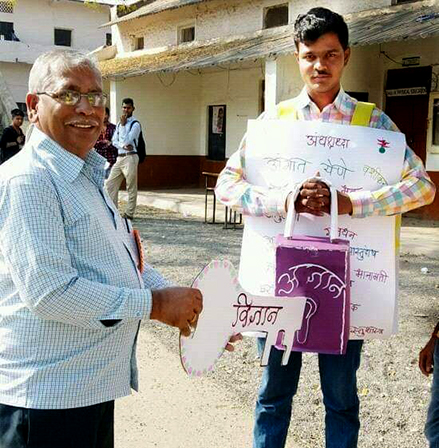 He started using what he had learnt at MAVA sessions by doing some of the housework. Sometimes his mother objected and sometimes he persisted. For example, he has been including his mother’s name while writing his name, despite a few classmates jeering him. Although he has not shared with his sister about what he has been learning in MAVA sessions, he is planning to share the MAVA booklet with his sister after her exams.
He started using what he had learnt at MAVA sessions by doing some of the housework. Sometimes his mother objected and sometimes he persisted. For example, he has been including his mother’s name while writing his name, despite a few classmates jeering him. Although he has not shared with his sister about what he has been learning in MAVA sessions, he is planning to share the MAVA booklet with his sister after her exams.
Although he has a number of friends, Abhijeet was able to share MAVA learning with some of his close friends. He accepts that when a gang of friends sit together and pass lurid comments on girls passing by, he is unable to express his displeasure. He said, “The society is too overpowering to be able to change things by one or two persons”. He understands his limitations in communicating orally and feels the need to have more training and skills to work on gender equality seriously.
Having become sensitive to the fact that women are used as “masala” to make advertisements and movies attractive to common people, Abhijeet created a gender-based short film for his animation course. He brings forth the story of a young woman who suffers domestic violence and faces the pressure of aborting her female foetus. She finally says NO. Abhijeet would like to circulate this film through MAVA sessions. He would like to make films and animations that talk to children about gender equality so that it gets imbibed easily at the right time. This he believes will work on the society in a gradual but an assured way.
Story 12
Ganesh Jadhav
Finding his role model
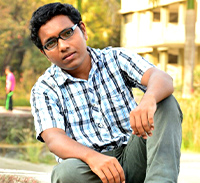 As a child, Ganesh had not liked going to school. Although the School Principal was a kind-hearted man, he found most of the teachers to be quite acerbic. They would never miss an opportunity to taunt him about “my kind of children” being given what they did not deserve and could not appreciate. He had very few friends in school and he was relieved to return to his home located in an overcrowded, industrial belt in a suburban area. Ganesh was quite an irregular student at school and college and he found himself either changing streams or taking breaks from academics, getting into odd jobs and finding himself dissatisfied with those jobs. After several ups and downs, he joined a night college, so that he could earn and learn at the same time. That’s where he got the opportunity to become part of the MAVA mentoring programme.
As a child, Ganesh had not liked going to school. Although the School Principal was a kind-hearted man, he found most of the teachers to be quite acerbic. They would never miss an opportunity to taunt him about “my kind of children” being given what they did not deserve and could not appreciate. He had very few friends in school and he was relieved to return to his home located in an overcrowded, industrial belt in a suburban area. Ganesh was quite an irregular student at school and college and he found himself either changing streams or taking breaks from academics, getting into odd jobs and finding himself dissatisfied with those jobs. After several ups and downs, he joined a night college, so that he could earn and learn at the same time. That’s where he got the opportunity to become part of the MAVA mentoring programme.
During the camp and various other interactive sessions with MAVA, Ganesh found answers to several questions that had rumbled silently in his mind for some years. Questions like, how class, caste and religious systems have promoted discriminations and divisions in society, why physical attraction towards girls becomes so overwhelming for teenagers, why sexual issues are not discussed in families, why no one opposes the gender inequality practiced in everyday life, were being answered by MAVA mentors and trainers in a free and casual environment. He also realized how abuse words were focused on women and their sexuality and all the responsibility to managing a family’s good name lay on the women while the men went scot free. Ganesh’s mind sought more and more as he started seeking answers to his queries in articles, books provided by MAVA. He could also call up and ask a quick query or a nudging doubt to some of his mentors in the middle of the night.
Changing gradually but surely
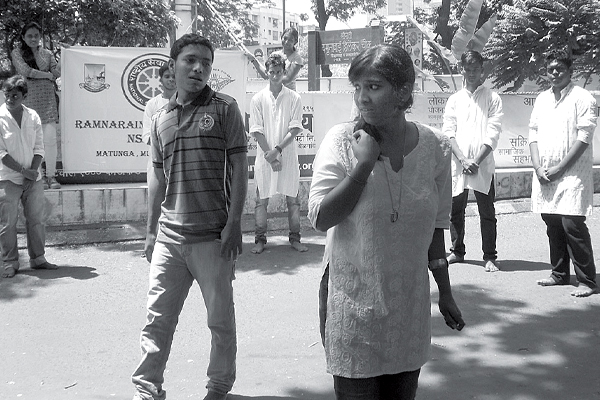 The discussions on gender equality and men’s role in bringing about a change prompted Ganesh to apply it in his everyday life. He started by washing his own plate after food at home. Gradually he started helping his mother at home with some chores that he could manage after returning home, listened to what his mother had to say on family matters, and watched the ‘Sakhi’ programme on Sahyadri channel1 with them. This made him more aware about the major problems faced by women in Maharashtra.
When Ganesh discussed changing male behaviours with some of his women relatives, they were sceptical “men will never give up their powers handed to them over generations”. He also tried discussing MAVA information with his friends in the neighbourhood, but they were not ready to accept these thoughts. He realized that it is difficult for them to understand the concept of equality as they have not been exposed to any in-depth training like he had, or exposed to any equal treatment in society. When some friends ask him for advice, he is ready to do so. His mobile is constantly busy with friends seeking help and guidance. Most of the time his advice to them is, “spend more on education and less on girl-friends, marriage ceremonies and religious activities”.
The discussions on gender equality and men’s role in bringing about a change prompted Ganesh to apply it in his everyday life. He started by washing his own plate after food at home. Gradually he started helping his mother at home with some chores that he could manage after returning home, listened to what his mother had to say on family matters, and watched the ‘Sakhi’ programme on Sahyadri channel1 with them. This made him more aware about the major problems faced by women in Maharashtra.
When Ganesh discussed changing male behaviours with some of his women relatives, they were sceptical “men will never give up their powers handed to them over generations”. He also tried discussing MAVA information with his friends in the neighbourhood, but they were not ready to accept these thoughts. He realized that it is difficult for them to understand the concept of equality as they have not been exposed to any in-depth training like he had, or exposed to any equal treatment in society. When some friends ask him for advice, he is ready to do so. His mobile is constantly busy with friends seeking help and guidance. Most of the time his advice to them is, “spend more on education and less on girl-friends, marriage ceremonies and religious activities”.
Ganesh has been more successful in making presentations and orienting the younger lot of college youth about MAVA, conducting some sessions during the training camps. His contribution is much acknowledged by Harish Sir and the youth participants who have seen him take sessions. He also volunteers in organizing events for MAVA at different places in Mumbai, whether in colleges or outside. For some time, he was employed as a part-time staff of MAVA and he conducted sessions in coordination with NGOs working with slum and street children as well as children of sex –workers. The young boys are brought together to play football and sometimes ‘just chat’ under a tree. He has managed to guide quite a few young boys who look up to him today and can now aspire to come out of the shackles of family deprivation. Ganesh feels it is important to be a good human, to be honest and not a “show off”, to think, question and analyse issues properly, and to help people when they need it.
Ganesh is presently working part time with a local agency and studying journalism during the day. He said, “Harish Sir has guided me when I was feeling thoroughly confused about what to do after graduation”. He now recognizes his own potential to work hard and succeed in the field of his choice. He also realizes the prospects of getting a job where he can advocate ideas for social change.
Responding to a question about what he would like to do to change the social environment for women, he listed down many activities that he would like to do: conduct gender sessions for men and women who are above 40 as he feels they are the parents and office bearers of many institutions, conducting weekly groups meetings for youth, setting up a library for reading on gender issues, mass awareness campaigns like prabhat pheris (early morning rounds by groups) and street plays, forming a group of resource people who could participate in all these activities so that there is a continuous flow of gender equality ideas to different groups and sections of people in the city. However, he cannot deny his need for a regular income and MAVA’s support for conducting these programmes.
1 A talk show tailor-made for women and dealing with various issues, offering expert advice on issues like health, nutrition, savings, child care, government schemes and empowerment of women.
Story 13
Nisaar Pratap Zalte
Traversing a journey of self-introspection
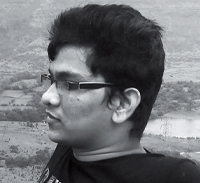 Nisaar came to MAVA with a strong dalit movement background. At the age of 29, he had published his collection of poems, 'Mhatari Melyache Dukkha Nahi' and was a regular contributor to a radical magazine, Vidrohi1. He had much experience working with marginalized groups and had joined the Masters programme to study in Dalit and Tribal issues at Tata Institute of Social Sciences. In the first year, he was placed for year-long field work with MAVA.
Nisaar came to MAVA with a strong dalit movement background. At the age of 29, he had published his collection of poems, 'Mhatari Melyache Dukkha Nahi' and was a regular contributor to a radical magazine, Vidrohi1. He had much experience working with marginalized groups and had joined the Masters programme to study in Dalit and Tribal issues at Tata Institute of Social Sciences. In the first year, he was placed for year-long field work with MAVA.
As a young boy from a village in Dhule, Nisaar loved living with his grandparents where he could be carefree, skip school and play cricket with his band of friends. His initiation to dalit movement came when his activist cousin brother encouraged him to join him in organizing educational and cultural programmes, for youth in the community. Nisaar’s inherent leadership motivated him to face up to the challenge. With increasing exposure to dalit history, literature and activists, he found himself drawn to reading, discussing and sharpening his understanding of social justice and human rights. He soon realized it was essential for him to continue his studies and did so while helping his father in agricultural business, and doing community work.
He came to Mumbai in 2008, as he felt the need to earn a better income for his family. Here he found a job with a bank in which he used his communication, and organizing skills. His salary also helped him complete his graduation and venturing into the NGO world in 2013. Soon Nisaar realized that an institution like TISS would give him better career prospects even while upholding human rights of the marginalized sections of society. When he applied and was selected by TISS, his family readily supported him, his wife and two –year daughter.
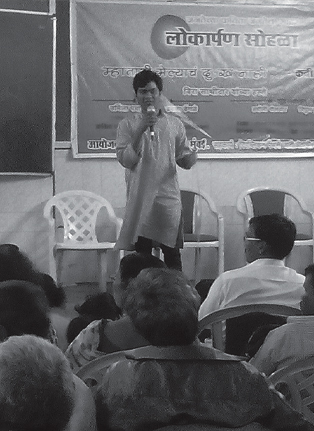 Nisaar’s first exposure to MAVA’s residential training was the one organized for college youth from Mumbai. He said, that it was useful for getting a better understanding of the close linkage between patriarchy, masculinity, social institutions, like family, religion, education, politics and media, and gender issues. During the training, Nisaar saw how the resource persons made learning the topics interesting. He recalled how one resource person made the students play a game which showed in a simple but clear manner the close interlinkage between caste, class and gender inequalities. Another interactive teaching activity useful in clarifying the concepts of naturally defined and socially construction of gender was the ‘12 sentences activity’. “These sentences can confuse even those who are well-read and make you think really deeply and clarify many nuances of gender in a real sense.”
Nisaar’s first exposure to MAVA’s residential training was the one organized for college youth from Mumbai. He said, that it was useful for getting a better understanding of the close linkage between patriarchy, masculinity, social institutions, like family, religion, education, politics and media, and gender issues. During the training, Nisaar saw how the resource persons made learning the topics interesting. He recalled how one resource person made the students play a game which showed in a simple but clear manner the close interlinkage between caste, class and gender inequalities. Another interactive teaching activity useful in clarifying the concepts of naturally defined and socially construction of gender was the ‘12 sentences activity’. “These sentences can confuse even those who are well-read and make you think really deeply and clarify many nuances of gender in a real sense.”
During the year-long MAVA field-work experience, Nisaar learnt lot of things about gender issues, MAVA’s method of working and the personal commitment that gender equality demanded. The next step was using what he had learnt during the residential trainings, for conducting sessions in some of the Mumbai colleges. Coming from rural background, he could see how some of the participating youth had no clue about glaring inequalities faced by girls and women in the villages. “So how could they understand poor dalit women’s struggles and problems that were so far away from their urban realities?” Yet, he tried to introduce them to the harsh world by sharing his life experiences.
For Nisaar, some learning came during the street play campaign, “Say No, Accept No”, as there were many youth (boys and girls) sharing their experiences on sex, sexuality, society’s views, peer pressure, etc. The long and intense youth campaign left the key message in Nisaar’s mind: “I shall follow the “Say No, Accept No” norm because it is essential for me to be a good human being. It made me think of small, everyday things and behaviors, about living and doing things that prove that I am being a gender-equal person”. But it was not easy for him as he realized that his patriarchal sub-consciousness was stronger than his thought consciousness. “It can be too much to follow”. He added that he felt very happy and liberated while sharing his learnings from MAVA with his wife. The changes in him makes her remark that he has “become a little bit more aware and understanding towards her feelings”. But dealing with her perception of equality needed strength and patience. For example, when his wife decides about what she is doing during the day, going with friends or going to her parents home, deciding about finances, quarreling with him on some issues, sharing house work, or about when and how she wants to express her sexuality, it takes a lot for a male to accept it easily. He looks like the cat that got the cream.
His personal change plan is to follow the pulsating campaign message, “Say No, Accept No” in totality. Looking at MAVA’s focus on encouraging men to move towards gender equality he says, “although the dalit movement has always seen gender equality as an important part of the broader movement for human rights, the MAVA approach is different, non- aggressive, persuasive, one that touches many spheres of life. It goes beyond the theoretical”. Looking at the challenge philosophically he adds, “when we are fighting for caste and tribal rights, or in a class war, there is atleast some who are sympathetic, empathetic. Therefore we can be aggressive. On the other hand when it comes to fighting for gender equality, there is just no support. We need a different approach, the MAVA approach”.
Being strongly linked to the dalit movement, he also plans to study more on the gender, caste and marginalization intersectionality. He has been sharing his new perspective with his friends and comrades but wishes to use this knowledge for working with his community more intensely in future.
1 Vidrohi, a Marathi-language magazine edited by activist Sudhir Dhawale, focuses on human rights of the marginalized.
Story 14
Tanaji Rajaram Reshma Patil
Deconstructing the idea of Masculinity
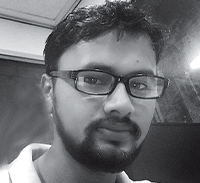 Tanaji, belongs to a small village, Dele, with a population of a thousand people, with a primary school, and which lies on the border of Konkan. The children have to go a school far from the village for higher classes. This makes many children, especially girls, drop out of school. Tanaji was one of the few who completed his tenth class by living in a hostel. Becoming a sixteen year old migrant to a mega city, Mumbai, was a painful but a necessary decision for Tanaji. His family consisting of a younger sister, father and mother continue to live off their 4 acres agricultural land.
Tanaji, belongs to a small village, Dele, with a population of a thousand people, with a primary school, and which lies on the border of Konkan. The children have to go a school far from the village for higher classes. This makes many children, especially girls, drop out of school. Tanaji was one of the few who completed his tenth class by living in a hostel. Becoming a sixteen year old migrant to a mega city, Mumbai, was a painful but a necessary decision for Tanaji. His family consisting of a younger sister, father and mother continue to live off their 4 acres agricultural land.
Like many other young migrants, Tanaji soon learnt to use his skills and hard work to earn a livelihood. His aim was to earn a living and enroll for college education. He first identified a night college (Dr. T. K. Tope Night College, Parel) and then found a job. He was working as a cook in a canteen and earning a meagre Rs. 5000 per month, but he had a place to stay, bathe, sleep, and study. Starting his day at 4 am in the morning, finishing canteen work at 4 pm, left Tanaji with just enough time to reach his night college.
When he entered first year of senior college, he joined the NSS. One of the NGOs that made a presentation for students was MAVA. Tanaji recalls, how in the presentation made by “Harish Sir”, the idea that men could be different from what he had known so far, was extremely enticing. He had seen how his mother had been beaten and abused by his father almost daily, how his elder sister was married off to a person she did not wish to marry, and his younger sister was always told she was ‘not wanted’ as the third child. Some of his childhood girl friends were not allowed to study and some were abused and threatened by his male friends who thought that was the meaning of being ‘male’. Moreover, the questions on gender, sexuality and equality posed by Harish Sir to the students, which hardly anyone could answer, made Tanaji feel “these are also my questions”. That started his journey with MAVA.
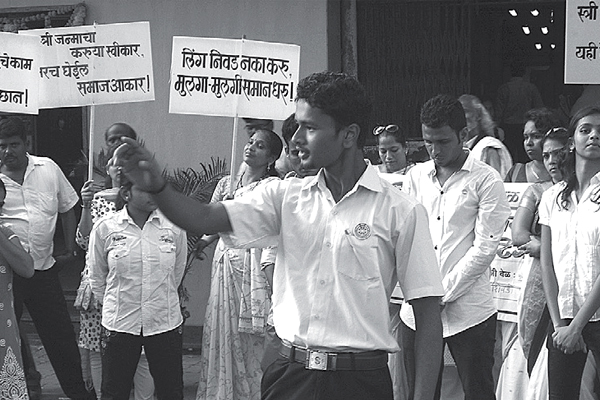 Tanaji’s feelings at the first residential workshop ranged from awe at the information he was receiving, to a feeling of angst that so many like him in his village had not received this information. He wondered why it was difficult for his science teachers to skip the reproductive organs and health chapters in the textbook, making him and many like him go to ‘shady’ sources to find answers. He felt calmed when he found all the resource persons sharing openly and freely scientific knowledge about male and female bodies and sexuality and learnt that menstruation was not a matter of shame but a healthy aspect of women’s body. He said, he was so excited that he asked all his questions and doubts to the resource persons and volunteers. It was a beginning to informal learning many skills like communication, and street-play making.
Tanaji’s feelings at the first residential workshop ranged from awe at the information he was receiving, to a feeling of angst that so many like him in his village had not received this information. He wondered why it was difficult for his science teachers to skip the reproductive organs and health chapters in the textbook, making him and many like him go to ‘shady’ sources to find answers. He felt calmed when he found all the resource persons sharing openly and freely scientific knowledge about male and female bodies and sexuality and learnt that menstruation was not a matter of shame but a healthy aspect of women’s body. He said, he was so excited that he asked all his questions and doubts to the resource persons and volunteers. It was a beginning to informal learning many skills like communication, and street-play making.
His sense of gratitude to MAVA makes Tanaji find time in his busy schedule to volunteer for MAVA’s events. He said, “I want to continue volunteering for MAVA while working outside”. Tanaji, after his studies, was involved in arrangements for a 2 day Film Appreciation Workshop in his Alma Mater. He wanted more boys from his college to learn what he had learnt. “What I learnt is that I need not get into fights and do pushups in gyms to be identified as a ‘male’. I can be who I am and help people, and contribute to social change and that also shows my mental strength.”
What does he plan to do about what he has learnt?
To this question, Tanaji said that he is so excited with the knowledge he gained that he shares it with anyone interested. His younger sister and some of his closest friends were the first. It has also made him question some of his father’s decisions. He forced his father to allow his younger sister to continue studies till tenth class and not be married off at a young age. “I threatened to quit college if my sister is not allowed to complete her studies.” With a smile he added, “Now I have to make arrangement for her college as she wants to study further”.
He says, “a lot needs to be done by organizations like MAVA. Most girls in my village are less educated, married early, have 2-3 children by 25, are weak and have malnourished children. There are so many villages that need NGOs like MAVA.”
After his graduation last year, Tanaji up-skilled himself so that could find a better job. He is both proud and humble about his achievements. “I was the first boy in my village who completed graduation. After me, many boys have become graduates and now some girls are pursuing higher education”. But a lot has yet to change. He said he has seen some girls from his village being forced to marry boys they did not want to. One of the girls was abducted because she had said NO to the boy who claimed to be in love with her. Tanaji wants this environment to change. Girls have equal rights as boys and can say ‘No’. He said, “When my girlfriend rejected my proposal for marriage, I accepted it. I was sad, but I accepted. Later on, I asked her if we could continue to be friends and she accepted it. So now we continue our friendship.”
Since the interview, Tanaji had moved to a new job. He has plans to compete for MPSC examination and then reach his final goal of joining the IAS.
Story 15
Vedprakash Jaiswal
Breaking Barriers, Building Bridges
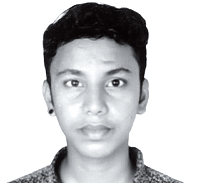 Vedprakash Jaiswal, says he is different from other boys in his community. He helps his mother, aunties in his neighbourhood, with water-filling, carrying loads from the bus stop. He does not want to go the same way as the other boys in his area. They are all either gambling, loitering or passing comments on girls. He says vehemently “I don’t want to be like them”. He also agrees with his mother who gets battered by her husband regularly, that he should not grow to be like his father.
Vedprakash Jaiswal, says he is different from other boys in his community. He helps his mother, aunties in his neighbourhood, with water-filling, carrying loads from the bus stop. He does not want to go the same way as the other boys in his area. They are all either gambling, loitering or passing comments on girls. He says vehemently “I don’t want to be like them”. He also agrees with his mother who gets battered by her husband regularly, that he should not grow to be like his father.
Ved is not just repeating words copied from someone. They are words that mean a lot to him and his mother. They express his desire to be a better human being, to not create fear and anger in his loved ones. Ved, a small built, with a stylish hairstyle, and a shy smile, had started interacting with two –three mentors from MAVA, two years back. The group of about 10-12 boys from his slum and Ganesh and Aspar (staff from MAVA), would play football on the playground closeby and chat under the trees about some serious matters; gender violence, gender inequality, men’s behaviours and attitudes.
This was the beginning of Umang (meaning Aspiration) project started in 2014 with youth from the community. After a few months, they were taken to Lonavla for a 3-day residential workshop.
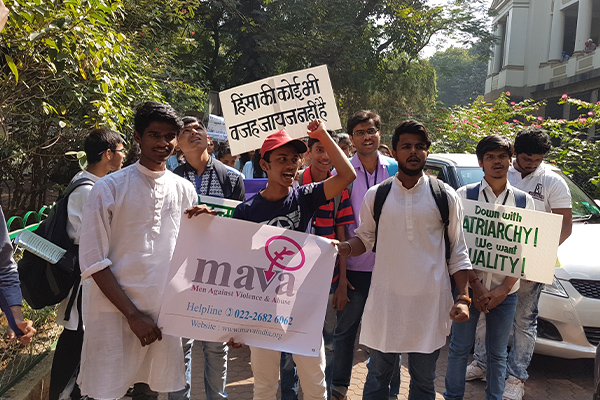 Here, Ved along with his community friends met boys like him. There he learned about “how the girls and boys’ body is, how we feel attracted to girls, how we can be abused if we are unaware, about laws that protect children”. He said, Amol Sir and Harish sir took training. They asked us to think about many things like, why there are so many bad words for women, why girls cannot be equal to boys in playing cricket, in studying, working in big companies, how would it feel to be teased like boys tease girls, why boys cannot grow their hair like girls, or wear earrings, necklaces, why we tease people for doing what they like doing”, why films show only some body parts”. They learned about “mardangi” (meaning Masculinity) and how this makes boys behave “badly”.
Here, Ved along with his community friends met boys like him. There he learned about “how the girls and boys’ body is, how we feel attracted to girls, how we can be abused if we are unaware, about laws that protect children”. He said, Amol Sir and Harish sir took training. They asked us to think about many things like, why there are so many bad words for women, why girls cannot be equal to boys in playing cricket, in studying, working in big companies, how would it feel to be teased like boys tease girls, why boys cannot grow their hair like girls, or wear earrings, necklaces, why we tease people for doing what they like doing”, why films show only some body parts”. They learned about “mardangi” (meaning Masculinity) and how this makes boys behave “badly”.
Ved along with other Umang group boys were given training in communication and street- theatre. He recalls how they participated in performing many street plays and attend some big programmes like at YWCA, and meet “nice educated people”, He also learnt that education is very important and worked hard for his X th class exams. He is studying now in junior college aspiring to get a government job. MAVA has also helped him with his educational fees. He says he and his mother are very happy that he is learning new things. “I am more confident, I think properly, I advise some of my friends, I don’t shout at my mother and sister and help them”.
Ved has become a role model for some other children in the community. He continues to spread messages among peers on gender equality through series of street-play performances across the city.
Story 16
Yogesh Kanthale
Enthralled by the idea of social change
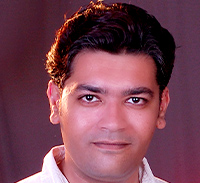 Yogesh got oriented to MAVA when he was in his Second Year Bachelors in Arts at a Pune city college in 2006. During one of the extracurricular activities, he became part of a group of students who attended a lecture delivered by Harish Sadani from MAVA, on the need for youth to be aware of the world around them and their role in changing the society. He was extremely impressed, and agreed to participate in a 7-day camp held by MAVA at the Pune University campus. During the camp, he heard a number of resource persons discussing very sensitive topics like body changes during adolescence, sexuality, women's workload, male-female equality in a very interesting manner. He was also impressed by a husband- wife couple (late Dr. Anant and Shanta Sathe) who were experts at guiding young people about family life, marriage and reproductive and sexual health in Pune.
Yogesh got oriented to MAVA when he was in his Second Year Bachelors in Arts at a Pune city college in 2006. During one of the extracurricular activities, he became part of a group of students who attended a lecture delivered by Harish Sadani from MAVA, on the need for youth to be aware of the world around them and their role in changing the society. He was extremely impressed, and agreed to participate in a 7-day camp held by MAVA at the Pune University campus. During the camp, he heard a number of resource persons discussing very sensitive topics like body changes during adolescence, sexuality, women's workload, male-female equality in a very interesting manner. He was also impressed by a husband- wife couple (late Dr. Anant and Shanta Sathe) who were experts at guiding young people about family life, marriage and reproductive and sexual health in Pune.
This training hit a chord in Yogesh’s mind for several reasons. One of the reasons was that he had seen his mother slog as a door-to-door saleswoman for 8 hours every day, returning home and continuing to do household chores. His mother was forced to take up this job due to their “not so good” family condition. His father owned a small ‘kirana’ (multi-item) shop and income from that was insufficient for a family with three growing boys. He had seen how his mother had to face the taunts of people around, deal with all kinds of harassments by customers and the pressure of earning a certain income for supplementing her husband’s income. Another reason for his affinity with MAVA was that he and his friends were quite confused when it came to girls and their own sexuality. He found answers to a lot of his questions. He was also very impressed by the different methods in which the MAVA resource persons explained the importance of communication and expressing oneself.
Yogesh decided he wanted to be part of this “changing society”.
He continued to be active with MAVA during his college days. He knew he was good at one- to- one and small group communication. As peer communicator, “we took up many issues like harassment of girls, treating women badly, violence and rape” for discussion and campaigning.
Yogesh’s interactions with MAVA reduced after completion of college but did not die out. He continued to take up MAVA activities as time permitted. He passed on information about events happening in Pune to new friends and colleagues. He took advantage of his close association with young people who were linked to political parties in the neighbourhood and discussed many issues. “These young people were without any directions and had no one to guide them and so were exploited by politicians, Godmen, and others. Yogesh’s friendly and ‘easy to approach’ personality made him a peer counsellor. He realized that many of his friends had one thing in common: they could not ask questions about sensitive issues like sexuality with elders at home. They had no forum where their doubts would be discussed or answered. Yogesh made himself accessible and gave them every opportunity to quiz him. They would discuss many issues like girlfriends, sexual health, family tensions, marriage, unwanted pregnancy, during their everyday conversations, or on weekend outings and sometimes when there were emergencies. When there were questions or doubts that he could not find convincing answers, he advised them to meet expert counsellors like Dr. Anant Sathe. Since Yogesh himself had taken counselling along with his girlfriend (now turned wife), he was able to convince many of his friends to undergo counselling.
Using MAVA Guidelines for Work & Life
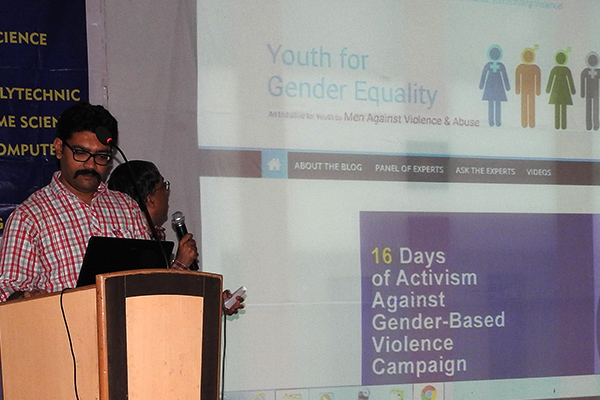 As a professional in the Information Technology (IT) sector, he found that a substantial number of young women were professionally trained and they worked alongside young men- all were expected to work with ruthless deadlines. He soon realized that the young men had almost the same queries and doubts on gender and relationships. His approachable personality made him a boss who could give sound, unbiased advice. He realized that the women were expected to reach home at a specific time, manage all family responsibilities, etc., which denied them the extra time and energy needed for the new skills training expected from them as a professional. These pressures affected their work output. Since he wanted them to give their best in an unburdened work environment, Yogesh found ways of managing training time and work division without treating them with a chivalrous approach, and being unjust towards the young men in his team. He embedded the themes of gender equality and respect to all, in his discussions on teamwork. When his colleagues, team workers had problems at home or in relationships, they felt relieved to have Yogesh to hear them out and extend his advice.
As a professional in the Information Technology (IT) sector, he found that a substantial number of young women were professionally trained and they worked alongside young men- all were expected to work with ruthless deadlines. He soon realized that the young men had almost the same queries and doubts on gender and relationships. His approachable personality made him a boss who could give sound, unbiased advice. He realized that the women were expected to reach home at a specific time, manage all family responsibilities, etc., which denied them the extra time and energy needed for the new skills training expected from them as a professional. These pressures affected their work output. Since he wanted them to give their best in an unburdened work environment, Yogesh found ways of managing training time and work division without treating them with a chivalrous approach, and being unjust towards the young men in his team. He embedded the themes of gender equality and respect to all, in his discussions on teamwork. When his colleagues, team workers had problems at home or in relationships, they felt relieved to have Yogesh to hear them out and extend his advice.
Yogesh’s feeling of satisfaction comes from the fact that his short but rich association with MAVA has made him a better human being, a more attentive, more expressive person, which has helped him, his family, his friends, and colleagues at work. His wife has now completed her training and works alongside while venturing as an independent entrepreneur. Yogesh’s joint family members (elder brothers and sisters-in-law) accept his counsel although he is the youngest in the family as he listens to all, and thinks fairly and guides appropriately.
Yogesh Kanthale has offered his services and help MAVA to put up a virtual platform for sharing MAVA’s ideas widely as he believes the youth generally hook up with the virtual world much faster. He also feels that there is a small percentage of youth who will take some initiative for bringing about changes for themselves and others. But they need a free accessible platform for doing this.
Story 17
Sarath Warrier
In every work that I do, MAVA’s approach will be guiding force
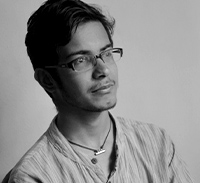 Sarath belongs to a nuclear middle class family. His father is a postgraduate and has a travel agency. His mother is a graduate in Music studies and takes dance and music classes. His younger sister is a trained dancer, is busy studying college as well as doing dance recitals. She was awarded membership to the UNESCO’s International Dance Council, informs Sarath proudly.
Sarath belongs to a nuclear middle class family. His father is a postgraduate and has a travel agency. His mother is a graduate in Music studies and takes dance and music classes. His younger sister is a trained dancer, is busy studying college as well as doing dance recitals. She was awarded membership to the UNESCO’s International Dance Council, informs Sarath proudly.
At home, Sarath has seen gender inequality only in subtle forms. For example, his sister has a time limit for returning home from her college, while he does not have any such restrictions. His mother and sister have to follow the ‘stay away from all household chores during menstruation’ norm when his grandmother from village comes to stay with them. On other days, everyone is supposed to help in all the family chores; he and his father cook on some days when his mom says so; all are consulted for major family decisions. This is different from his friends’ families, where the mothers cover their head or have a veil when they are in front of elders and outsiders.
As a student while doing his Bachelors in Mass Media, Sarath was good in studies and debates and was able to withstand all kinds of peer pressure. He was happy to be one of the three selected boys from his college for the MAVA camp in 2014. At first he thought the camp would be like other NSS camps, some field work, doing some physical activity, surveying, collective cooking, camp-fire, etc. But the MAVA camp was very different.
The MAVA trainings did not preach; they gave facts and analysis. He was aware of some of those facts and figures about gender equality but after the training, “I was enlightened on how the society works. There are hundreds of small and big prejudices which we hold and it needs rigorous conscious effort to keep them at bay. That there is a struggle in society so widespread, and it is hidden in the guise of convention, culture, tradition. Conscious efforts are required from men to stop discrimination and awareness must be spread; men must at least start thinking about all this”.
The message he took back from the camp like many other participants was that he must not fall prey to false prejudices and discriminate against women on that basis. Later on, the 4-day street play training introduced him to a traditionally used media and its power to facilitate social change. He learnt the method of writing a street play. He recalled how the presence of girls during the training made the boys awkward in the beginning. Gradually, they realized that it broadened their perspective on gender issues. They could understand how the girls view boys’ behaviors and their feelings and responses which were incorporated in the script. He learnt the skill of dialoguing and understanding an issue from different angles.
After days of practice sessions, he was happy to perform the collectively scripted street-play at several places along with the team. Sarath said, “It was the greatest experience I ever had and it was a new media for me to explore.” He said the play kept evolving as they moved from place to place and received people’s feedback. On one occasion, when they were performing at SNDT Women’s University, a student from Rajasthan, shared how one rickshaw driver had abused her in her home town and when she asked the police to help they refused. She wanted to know what could have been done. The street play group directed her to an NGO where she could file a complaint against the rickshaw driver and the police.
As a student of media, the exposure to interesting gender-based films was like an icing on the cake. He got the opportunity to attend the short- film screenings event at US Consulate Mumbai, and the Samabhav Film festival arranged by MAVA. He enjoyed the discussions that take place after the screenings as they provided many new insights to him from gender and media perspective.
Taking MAVA ahead
Sarath shares his MAVA experiences with his family and they agree to most of the ideas. They too appreciate positive changes in him. He has also been talking and discussing with his friends. Some are sceptical, as this change cannot happen with only one person, some say it’s a waste of time and some agree wholeheartedly.
As expected of MAVA mentees, he arranged two sessions in his college so that the other youth could be oriented to gender issues. He got a fairly good response to both. He also took the initiative in organizing a short film-making competition for students. Themes focusing on gender equality were given and the student participants had to develop a short film within 60 hours. Sarath feels it was a success as 400 students packed the auditorium and watched gender-sensitive films over 2 days.
At a personal level, he feels more comfortable talking to girls now and has developed the right attitude towards them. He is more sure about what he wants to be as a human being and what he wants to do in future. As a youth who is aiming to take on media as a career, he says, “in everything I view, make, write, review, and organize, I will keep my gender sensitivity lens ON.”
Sarath started helping in the development of MAVA blog space, after doing a professional training in film-making at the Film and Television Institute, Pune. He aims at having a good combination of intense, crisp and relatable content, which is also funny, catchy and colourful, so that youth get attracted to it and feel inclined to share their experiences and learn from others.
Story 18
Ravi Jaiswal
Sensitivity coupled with high energy, he rises
 February - March 2017, just before his final MSW exam, was a hectic time for Ravi. He was actively participating in several programmes held by his college and NGOs in Mumbai; a Bollywood song tweaking competition organized by Akshara 1, a human chain against violence and abuse of women on International Women’s Day, a ‘Making Mumbai’ campaign with YUVA2 , a State-Level competition ‘Transform Maharashtra’ with his college team Parivartan, encouraging citizens to vote during the elections. All this activity kept Ravi happy and satisfied, as he is one who craves for action-oriented social work. Ravi’s ‘energy’ for participating in social development activities is much envied among his social work friends. Revealing his secret, Ravi said, he had undergone a Vipassana3 camp, where he learnt to ‘center’, and stabilize his thoughts, reflect on issues and find solutions. He says it has helped him a lot as socio-economic problems have challenged him often and he has had to find ways to resolve them. Ravi has been able to find his solutions, whether it was getting financial support for a laptop or networking with Assam groups for his placement or getting a Community Connect Fellowship.
February - March 2017, just before his final MSW exam, was a hectic time for Ravi. He was actively participating in several programmes held by his college and NGOs in Mumbai; a Bollywood song tweaking competition organized by Akshara 1, a human chain against violence and abuse of women on International Women’s Day, a ‘Making Mumbai’ campaign with YUVA2 , a State-Level competition ‘Transform Maharashtra’ with his college team Parivartan, encouraging citizens to vote during the elections. All this activity kept Ravi happy and satisfied, as he is one who craves for action-oriented social work. Ravi’s ‘energy’ for participating in social development activities is much envied among his social work friends. Revealing his secret, Ravi said, he had undergone a Vipassana3 camp, where he learnt to ‘center’, and stabilize his thoughts, reflect on issues and find solutions. He says it has helped him a lot as socio-economic problems have challenged him often and he has had to find ways to resolve them. Ravi has been able to find his solutions, whether it was getting financial support for a laptop or networking with Assam groups for his placement or getting a Community Connect Fellowship.
When asked what makes him what he is today, Ravi’s spontaneous response is, “NSS” (National Service Scheme). This programme in his commerce college was what gave Ravi’s youthful brashness, impatience, and almost vagabond behavior a new direction. His capacity for hard work, his ability to work in teams, his communication skills, street play talent added impetus to his motivation for addition of 10 marks in his graduation score and made him a highly enthusiastic NSS volunteer. The graduation ceremony, where Ravi saw his parents feeling proud that he had won both the District & University level “Best NSS Volunteer” award, was the time when he decided he wanted them to continue to feel proud of him.
Coming from an average middle class family that had migrated from Gujarat to Mumbai, Ravi had seen his parents struggle to keep him and his sister in an English medium school, so that they could get some social advantage. He managed to “just clear” all exams till graduation. With no one to guide him about what to do after graduation, Ravi had asked his NSS programme officer bluntly, “what does it take to become an officer like you”. When informed about a social work degree requirement, Ravi started applying for admission and was accepted by College of Social Work Nirmala Niketan. He worked hard as a sales executive during summer, to fund his two year social work education.
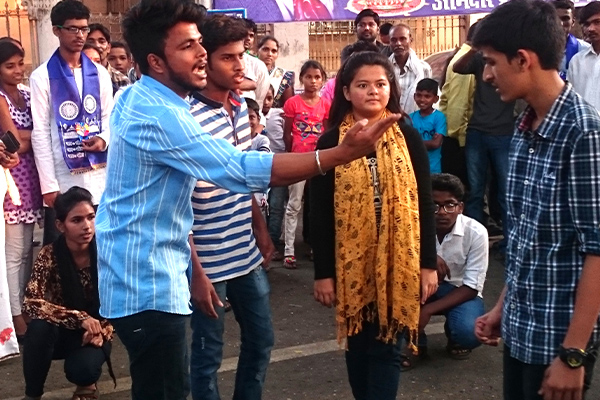 In the first year, the students had to do internship and Ravi was assigned MAVA. As a product of a society where women are taken for granted, Ravi found himself moving in the opposite direction very soon. He liked the MAVA idea of working with men a unique one. This novelty made him work hard to understand MAVA’s philosophy. The simple language used by Harish Sir made him understand much of it. When he was unable to grasp some ideas and concepts, he would request Harish to explain it further. All these formal and informal sessions and mentoring situations helped Ravi a lot.
In the first year, the students had to do internship and Ravi was assigned MAVA. As a product of a society where women are taken for granted, Ravi found himself moving in the opposite direction very soon. He liked the MAVA idea of working with men a unique one. This novelty made him work hard to understand MAVA’s philosophy. The simple language used by Harish Sir made him understand much of it. When he was unable to grasp some ideas and concepts, he would request Harish to explain it further. All these formal and informal sessions and mentoring situations helped Ravi a lot.
A simple realization that the male dominant, lopsided perspective was creating havoc in society and these could be solved only if men changed their way of thinking, was a new beginning for Ravi. He started doing his household chores and became more sensitive towards his mother, sister and girls in the neighbourhood and college. When he learned about menstruation stigma, he was shocked to know that women still faced the humiliating treatment of sitting away from family and friends for five days of a month.
MAVA internship gave Ravi the opportunity to meet well-read and knowledgeable people who were committed to gender equality. MAVA’s College Orientation sessions, gave him the opportunity to talk about gender issues with many other college youth like him. Ravi said, he understood their way of thinking, what could motivate them to think differently, what could make them stop sitting on the fence and join the MAVA programme more enthusiastically. At some colleges, he found himself assessing the college environment before an orientation so that he could adapt the MAVA presentation to suit the group. Mentees influenced by Ravi recall Ravi’s orientation talk as something that changed the way they thought about girls and joined MAVA leadership camp with a view to decreasing gender inequality and violence.
Ravi’s association with MAVA continues physically as well as philosophically. The street-play campaigns of MAVA helped him to participate actively even after his internship was over. He has been expressing his views through social media as well, “men should be sensitized towards the needs of other genders in order to reduce gender-based violence”. He also uses Facebook regularly to keep in touch with his MAVA friends and for sharing social development issues where MAVA’s events and campaigns are now an inevitable and inherent part.
1Akshara, a Mumbai-based women’s rights organization had organized a Gaana Rewrite competition where common people could create their own version of a Bollywood sexist song by rewriting its lyrics.
2YUVA, Mumbai-based NGO working towards inclusion and empowerment of the marginalized and vulnerable sectors of society
3Vipassana, which means to see things as they really are, is one of India’s most ancient techniques of meditation.
Story 19
Mayur Lad
Where Actions had the solid foundation of thoughts
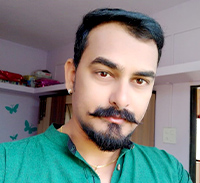 Mayur was 25, had completed his MSW from Yeshwantrao Chavan School of Social Work, Satara, and was looking out for a job. Coming from a family of agriculturists, (his father and one of his brothers are farmers), there was an unstated pressure on Mayur to find a job as soon as possible. In 2010, Shramik Janata Vikas Sanstha, an NGO offered him the post of a project coordinator for MAVA’s Manush project, when the previous coordinator, Dhananjay was leaving. As a student social worker, Mayur had not given much thought and importance to gender issues. Moreover, he thought he was not a person who could talk about sensitive issues like sexuality. He recalls how he took up the job with a feeling that if he could not handle it, he would quit and look out for another job.
Mayur was 25, had completed his MSW from Yeshwantrao Chavan School of Social Work, Satara, and was looking out for a job. Coming from a family of agriculturists, (his father and one of his brothers are farmers), there was an unstated pressure on Mayur to find a job as soon as possible. In 2010, Shramik Janata Vikas Sanstha, an NGO offered him the post of a project coordinator for MAVA’s Manush project, when the previous coordinator, Dhananjay was leaving. As a student social worker, Mayur had not given much thought and importance to gender issues. Moreover, he thought he was not a person who could talk about sensitive issues like sexuality. He recalls how he took up the job with a feeling that if he could not handle it, he would quit and look out for another job.
Soon, his views changed. He participated in all the training sessions along with college youth, where the self-reflective and discursive training process helped him understand the key issues in gender equality. He started discussing with Harish Sir to understand the multiple nuances of being a gender-sensitive person, and started reading PurushSpandan(annual magazine brought out by MAVA)which he said was “a gold mine of knowledge and people’s experiences”. He said, he realized, “When we treat everyone, male, female, and transgender, on an equal footing, we evolve as better human beings.”
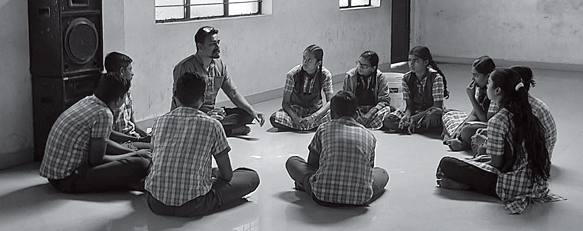 As the coordinator, his main task was to create a pool of young male communicators from the villages, who would address issues of gender-based discrimination and violence in the villages. Through group discussions, games, information sharing, Mayur encouraged them to work with MAVA to pass on the message of non- discrimination and gender equality in the neighbouring villages. They were guided into doing rapid surveys, trained in communication skills and mass awareness generation on topical gender issues.
As the coordinator, his main task was to create a pool of young male communicators from the villages, who would address issues of gender-based discrimination and violence in the villages. Through group discussions, games, information sharing, Mayur encouraged them to work with MAVA to pass on the message of non- discrimination and gender equality in the neighbouring villages. They were guided into doing rapid surveys, trained in communication skills and mass awareness generation on topical gender issues.
A year later, Mayur started conducting sessions during training camps and workshops for younger mentees. He had become skilled at facilitating discussions through interactive games, activities, story –telling, film screenings and getting active participation. As a staff mentor on the project, Mayur had many opportunities to further his social work skills of listening actively to what the youth were saying, questioning, communicating with patience, empathy, and tolerance, thinking critically, and encouraging participants to express their views and doubts freely. He had improved his capacity of presenting a topic in an organized and clear manner.Mayur was growing well in his first job and he was enjoying it.
The MAVA Influence
Through MAVA, Mayur attended training programmes and events conducted by NGOs and feminist groups which helped him to become more critical about his own thoughts and actions. At the personal level, he said, “many feelings and emotions were aroused in me and many changes occurred. My family and friends noticed. I became more confident as I spoke with facts and logic on different social issues. I formed stronger relations with my family members, especially my mother and cousin sisters. My friends were surprised that I have gained so much knowledge and I could delve so deeply and comprehensively on many sensitive topics. Although I did this from my childhood as my mother expected help from all of us, three boys, after MAVA I have become more conscientious about my contribution to household chores.”
MAVA’s collaborative project in Satara ended in early 2012. Mayur continued working with Shramik on the HIV/ AIDS project in the same region for another year. He says he used the knowledge on sexual health and gender issues gained while working with MAVA. He could deal with the 50 HIV +ve women and their families with great sensitivity.
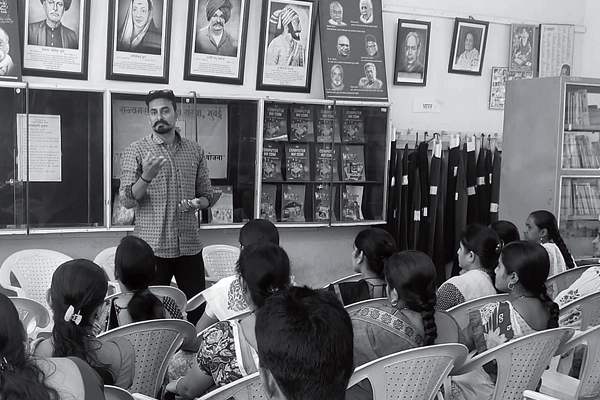 He said women have low status in our society. Due to HIV, they are treated worse than the lowest in the community. Mayur was expected to do interventions regarding appropriate health services, individual and family counseling and awareness generation. He recalls, “I went beyond the defined role as I took on dealing with their issues from a gender perspective… I understood their fears and tensions and helped their families to understand it as well and create a positive environment.”
He said women have low status in our society. Due to HIV, they are treated worse than the lowest in the community. Mayur was expected to do interventions regarding appropriate health services, individual and family counseling and awareness generation. He recalls, “I went beyond the defined role as I took on dealing with their issues from a gender perspective… I understood their fears and tensions and helped their families to understand it as well and create a positive environment.”
Mayur is presently working with an organization, Lend a Hand, which is conducting multi-skill development program for students of 8-10th class students, boys and girls in Satara. As the Coordinator, he introduces the topic of gender equality and sensitivity while orienting his team members as they have to be convinced to take the skill development programme to the girls with equal passion and have to work with them more sensitively.
MAVA is not a regular feature in his daily routine now. But, he always finds time to connect with MAVA mentors and mentees and conduct sessions whenever MAVA invites him to do so. He is happy that some of the peer communicators in Satara villages continue to stay in touch with each other through mobile and social media. MAVA’s project had showed that inputs in rural youth can leave a deep impact. He believes that conducting activities with rural youth in an ongoing manner is a good strategy. “I am not saying, 100 percent changes have occurred, as there are always ups and downs in our behaviours… there are so many push and pulls from all directions… The area where I live continues to have a demand for male children… Patriarchy is like a cement block that has hardened over the centuries and unless we destroy that concrete boulder, we will not move anywhere closer to gender equality.” He feels there is a need for continuous hammering on that boulder of patriarchy.
Individuals need support to change and there has to be a group, a community to support and guide them. Mayur also hopes that MAVA’s projects will have more continuity and trained people like him would be encouraged to continue working in this field. He himself would love to be back in the flow of this important issue once again.
Story 20
Deepak Sonavane
Constant Struggle, Strong Determination
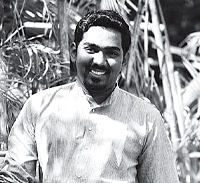 Deepak is presently working with a domestic workers union Maharashtra Gharelu Kamgar Union, in central Mumbai. As a growing boy Deepak had found support from civil society groups like Sathi Chandubhai Mehta Samaj Seva Pratishthan, located in the neighborhood. Here the children are given support for education, training for skill-building, communication, awareness building, leadership, and social service. This was one of the saving graces in Deepak’s life.
Deepak is presently working with a domestic workers union Maharashtra Gharelu Kamgar Union, in central Mumbai. As a growing boy Deepak had found support from civil society groups like Sathi Chandubhai Mehta Samaj Seva Pratishthan, located in the neighborhood. Here the children are given support for education, training for skill-building, communication, awareness building, leadership, and social service. This was one of the saving graces in Deepak’s life.
He and his two sisters were generally found either in the middle of domestic violence at home or at a police station while his mother waited for the police to take action against her husband. Sometimes, she would carry food for the kids so that they could eat food even while waiting. Deepak grew up knowing that domestic violence was the ugliest thing for a child to witness. He had a slightly weak constitution, and was therefore not sent out to play and interact with other boys in the community. His mother also wanted to protect him from bad influences in the community. He was generally lagging behind in his studies at the municipal school he attended and was labeled ‘dumb’. He recalls one of his English teachers who would generally sneer at his slow responses, had at one time grabbed his private parts to get a quick answer to a question. After that Deepak became the butt of more jeering, peer bullying and discrimination. All these incidents were difficult for young Deepak to shut out and they left an indelible mark on him.
Support from NGOs helped Deepak to come out of depressing thoughts, complete his education, find his capacities to be a contributing member of his family. As a youth, Deepak volunteered in government programmes in the community and NGOs in the locality. This made him a well-informed and helpful youth leader. NGOs like Balprafulta1, encouraged him to join in their programme against child abuse, where he learnt a lot about gender issues and child rights. Around the same time he also got to meet well known social activists like Ulka Mahajan. Thus the choice of joining a Social Work College for graduation was a foregone conclusion.
He met Harish Sir and was introduced to MAVA as a trainee social worker sent for field placement during 2015. Here he received a good grounding on body awareness, gender, sexuality, myths about sex, menstruation, masturbation, and gender equality from the resource persons at MAVA. He could now understand and review the traumatic experience with his teacher, his fear of men, why he could not climb a tree, his love for lavani 2, his doubts about being a male, violence against women and his reactions to it. He liked the way the students’ groups would be mentored by the MAVA team, discussing their seemingly small, simple queries and doubts seriously, making them think long and delve deep inside to answer some questions for themselves and also take decisions about the way they want to take gender issues ahead in their life. What Deepak also found very exciting were the Marathi articles written by Harish Sir and some other sensitive and learned men in MAVA’s annual Diwali magazine PurushSpandan, that provided him refreshing reading material.
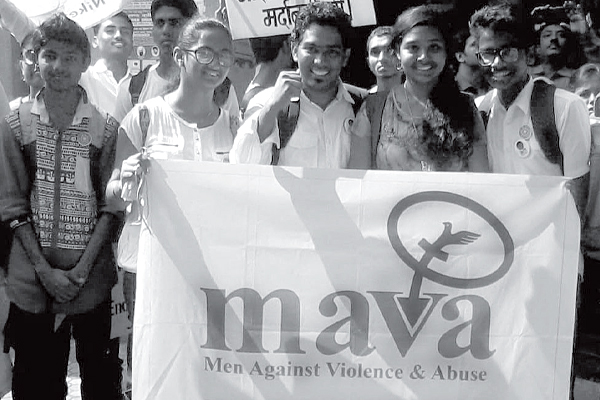 He was so awed by the information and perspective received from MAVA that he shared it with his mother and sister. After a number of discussions and arguments with his mother and sister on the traditional versus new ideas and views, Deepak could see them gradually getting convinced and freeing themselves from the traditional thought. For example, his sister started participating actively in family decisions. She was able to marry a man of her choice although he belonged to a different religious community. His mother supported her decision despite opposition from relatives. His mother also divided her property between both her children equally. Deepak encourages his mother to guide other women in the community on issues like getting their names on ration cards, giving education and skills to girls, fighting back domestic violence and their legal rights. He would like his mother to break totally away from the relatives who do not show her much respect. But his mother does not agree.
He was so awed by the information and perspective received from MAVA that he shared it with his mother and sister. After a number of discussions and arguments with his mother and sister on the traditional versus new ideas and views, Deepak could see them gradually getting convinced and freeing themselves from the traditional thought. For example, his sister started participating actively in family decisions. She was able to marry a man of her choice although he belonged to a different religious community. His mother supported her decision despite opposition from relatives. His mother also divided her property between both her children equally. Deepak encourages his mother to guide other women in the community on issues like getting their names on ration cards, giving education and skills to girls, fighting back domestic violence and their legal rights. He would like his mother to break totally away from the relatives who do not show her much respect. But his mother does not agree.
Deepak and she have decided to disagree on that matter. On being asked why he argues with his mother, Deepak says, “I love to argue my point. I have always admired Nikhil Wagle’s journalism as his arguments are not to hurt people but to empower them. I would like to be like him.”
As a step towards liberating himself from the gender stereotypes, Deepak went ahead and danced a lavani at a large youth gathering; something he had wanted to do for a long time. As part of his work with MAVA he undertook sessions on gender issues in a few colleges, and children’s observation homes. At places like observation homes, with officials monitoring the discussion, the gender issues could be better conveyed through street plays. At the Union of domestic workers he is presently working, he is able to intertwine gender equality issues in his legal and rights awareness, domestic violence and good parenting programmes. He would like the women domestic workers to respect their own work and at the same time respect the men who do domestic work or husbands and brothers who would like to stay at home and do housework. Deepak is also planning to mentor the children of the families of union members.
His long term goal is to work on improving women and children’s situation in Maharashtra. Deepak is not sure about the approach he would take to reach that goal - via political party or administrative system. But his gender equality perspective is clear enough to guide him to move towards his goal.
1 Balprafulta, A Child Rights Advocacy Initiative, is an NGO located in western suburb of Mumbai,
2Lavani is a popular traditional genre of folk art (song, dance) from Maharashtra.
Story 21
Onil Kulkarni
Traversing the journey to be a Changemaker making a difference
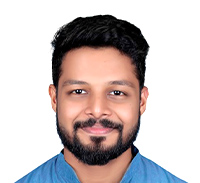 Onil had quit his well-paying job gained through campus placement after doing his Masters in Social Work, as the organisation was not doing what he had thought it would be doing. He could not work with an NGO that did not fulfil its promises to disabled clients. His conscience did not permit him to “take a fat salary and not do social work”.
Onil had quit his well-paying job gained through campus placement after doing his Masters in Social Work, as the organisation was not doing what he had thought it would be doing. He could not work with an NGO that did not fulfil its promises to disabled clients. His conscience did not permit him to “take a fat salary and not do social work”.
Onil’s commitment to giving back to society was ingrained in him by his parents. They advised him not to take up a job with any government agency in India as they are generally marked by common bureaucratic problems. They said it was important to not “just earn money and be engrossed with self-development” but to do “something worthwhile for the country”. As a school boy, he had enrolled in a number of army camps, thinking that joining the army was the best way to serve the nation. In the first three years of college, Onil was part of the NCC1 and in the final two years, he enrolled in the NSS, where he realised there was another way of serving one’s nation - by bringing about positive social change.
Through NSS, he worked with NGOs like Snehalaya and Aadhar2 and found out how civil society helps the most ‘needy’ and deprived sections of society. He also took some initiatives on his own. The third consecutive year of drought in Maharashtra, had seen a number of villages reeling due to water scarcity.
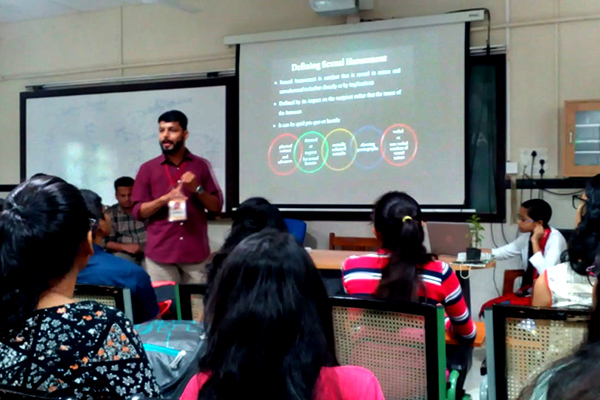 Onil and his friends decided to provide drinking water to a few neighbouring villages. They pooled in their money, sought help from others and organised 26 water tankers to five adivasi (tribal) villages in Shahpur taluka in Thane district for 3-4 weeks. He realised that common people extended support to good causes. He also realised that he had the ‘mettle to attempt the difficult’.
Onil and his friends decided to provide drinking water to a few neighbouring villages. They pooled in their money, sought help from others and organised 26 water tankers to five adivasi (tribal) villages in Shahpur taluka in Thane district for 3-4 weeks. He realised that common people extended support to good causes. He also realised that he had the ‘mettle to attempt the difficult’.
After completing his BA, he wanted to join a social work college but delayed results thwarted his plans. Unfazed, he took up a one-year Diploma course in Child Rights & Child Protection and the following year joined the Masters programme at Nirmala Niketan College of Social Work. As part of his first year internship, he worked with SNEHA3 on gender violence issues in the slum communities. In the second year he was sent to MAVA. His teacher advised him to see the other aspect of gender violence and merge the two in order to gain deeper insights on the complex issue. Although his first association with MAVA had started in 2013 when he had participated in Yuva Abhivyakti programme, the MSW placement was a totally different experience. The first experience had given him an exposure to the power of street-plays and the commitment of social activists like Sambhaji Bhagat4; the second one left a long lasting impact.
Harish Sadani at MAVA, became their (all students on placement) mentor as he provided them the basic training on gender issues and encouraged them to enhance their perspective through reading materials and audio-visuals available at MAVA. He guided them about MAVA’s way of thinking, encouraged them to participate, ask questions and take initiatives. He would introduce them to all the relevant people as well as involve them in the decision-making regarding action plans for programmes. Therefore it was not surprising that during the eight month placement at MAVA, Onil could conduct six gender training sessions at different colleges in Mumbai and Thane. This rich experience added to his communication, training and networking skills. Although he had received good amount of field exposure on domestic violence at SNEHA, at MAVA Onil said, he had learnt what he, as a male, must do to bring about gender equality.
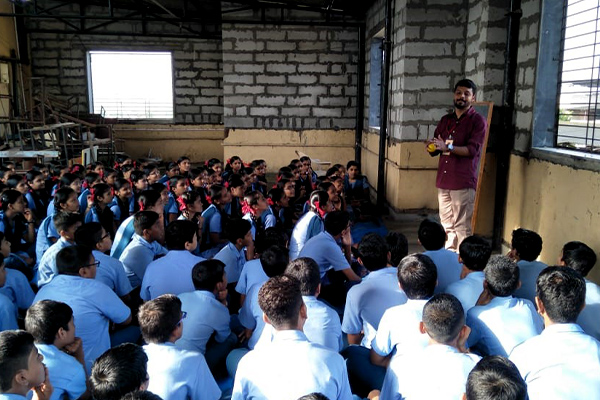 He also organized and conducted sessions within his college where he realized that boys studying social work are no different from boys in other colleges. Some did not agree to the concept of gender equality, some did not express their views and some wanted to express their views only through media. He along with some like-minded friends started a film society in college to focus on gender issues. Although he had not seen gross gender inequality issues in his family, the MAVA experience made him more sensitive to women’s issues in general and brought him closer to his mother. His chats at home around dinner or TV time have become more gender focused. However, they generally end up with his mother supporting him and his father opposing him.
He also organized and conducted sessions within his college where he realized that boys studying social work are no different from boys in other colleges. Some did not agree to the concept of gender equality, some did not express their views and some wanted to express their views only through media. He along with some like-minded friends started a film society in college to focus on gender issues. Although he had not seen gross gender inequality issues in his family, the MAVA experience made him more sensitive to women’s issues in general and brought him closer to his mother. His chats at home around dinner or TV time have become more gender focused. However, they generally end up with his mother supporting him and his father opposing him.
On the friends’ scene - when Onil disapproved his friends’ social media posts and comments that were demeaning to women, they were very angry with him. Onil expressed his hurt feelings saying “he had lost some of his close and old friends due to these conflicts”. But he was more upset that his friends including girls were not ready to want to move away from the traditional ways of thinking.
He is aware that gender equality is “difficult to digest” to many people and feels that there is a need for many more organizations like MAVA to work on this issue. He is ready to contribute to this issue, either through MAVA, other agency, or through his newly founded NGO called Swadhishthan (dwelling place of the self). True to his word, Onil with the help of a corporate group conducted gender training for 900 tribal students from ashram schools in Talasari taluka. This is a new beginning for Onil!
1 NCC, National Cadet Corps, is open to school and college students on voluntary basis.
2Snehalaya and Aadhar are NGOs working with the underprivileged and marginalised sections of society.
3SNEHA, NGO working to improve health of women and children living in Mumbai slums.
4Sambhaji Bhagat, is a well known Shahir (balladeer) and a Dalit activist from Maharashtra
Story 22
Prashik Ambulkar
Understanding Inclusivity and Embracing Diversity
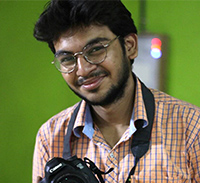
Prashik studied Economics for his graduation at Ramnarian Ruia College before he shifted his focus to photography which was his passion. He got to know about MAVA quite late as he was not part of NSS. Some of his friends had attended the gender-sensitization residential camp and had come back with a lot of ideas about equality between genders.
Prashik participated only during the street play workshops which proved to be a very different experience from what he had expected. Recalling the experience he said, “It was a 4-day programme and he learned a lot ... all of us were discussing what it means for a woman to say ‘no’ and a man to accept her ‘no’. Some girls who were also attending the street-play workshop and they were vocal about how they felt when they were teased, followed, and taken for granted. This was an eye opener. My thinking about girls changed during this short programme. My attitude towards girlfriends and women also changed as I actually saw how girls view boys. The street plays conducted in the lanes, corners and market places of Mumbai were great as I saw how people were responding to our ideas”.
Later on, Prashik also participated in another MAVA event, the short filmmaking competition on gender equality theme. Having learnt quite a few things about gender equality and non- discrimination, he expanded his perspective further through google, and discussions with his MAVA friends. He contributed two films for the competition, which were quite well accepted by the jury although they did not win prizes. Prashik was happy that he attempted something different and had satisfied his spontaneity and creative urge.
Prashik continued to have chats with the MAVA group in college which helped him to understand one more aspect more clearly. “The LGBTQIA individuals and our misconceptions about them were again a revelation to me and my other friends. I am now more informed and I can accept transgenders without any bias now. I also communicate with girls more sensitively and sensibly”.
Prashik feels that brief exposure with MAVA was a rich one, as he has a new perspective, a new lens, a more sensitive way of looking at people which makes him stand out from other aspiring photographers. “I now have a different perspective on gender and want to work towards promoting gender equality in society through this media.”
Story 23
Bhavin Makwana
Striving for a healthier tomorrow
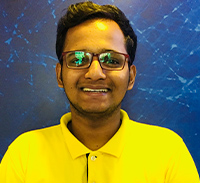 Bhavin introduces himself, “I belong to a ‘not-so-well-to-do’ family and my dream as a child was to earn a lot of money and live a happy life. I thought of getting into software engineering as that would give me a good job and good income”. When he enrolled in Thakur College of Science and Commerce in 2015, he also joined NSS where one day they were given an orientation on gender equality by Ravi Jaiswal (MAVA mentee). Bhavin recalls how he was greatly impressed with that lecture and he started rethinking on his career childhood goal. Later, he also attended the residential camp and the street play training where he “learnt a lot’’. What was also very interesting to Bhavin were the different methods the trainers used- games, songs, role-plays, films, interactive activities and simple language.
Bhavin introduces himself, “I belong to a ‘not-so-well-to-do’ family and my dream as a child was to earn a lot of money and live a happy life. I thought of getting into software engineering as that would give me a good job and good income”. When he enrolled in Thakur College of Science and Commerce in 2015, he also joined NSS where one day they were given an orientation on gender equality by Ravi Jaiswal (MAVA mentee). Bhavin recalls how he was greatly impressed with that lecture and he started rethinking on his career childhood goal. Later, he also attended the residential camp and the street play training where he “learnt a lot’’. What was also very interesting to Bhavin were the different methods the trainers used- games, songs, role-plays, films, interactive activities and simple language.
Impressed by the residential training he said, “we are unaware of so many facts about our own bodies and unconscious about our behaviours. For example, even though we love our mother we don’t pay attention to her, her workload, her pains, and her tensions. I also realized during the training that we boys enjoy so much freedom and while our sisters are treated badly. We practice so many direct and subtle forms of discriminations against our sisters and women in our families. I realized that only when we change our behaviour, things will change. We cannot expect the government to change everything. So I decided to make changes in my own thinking and behaviours.”
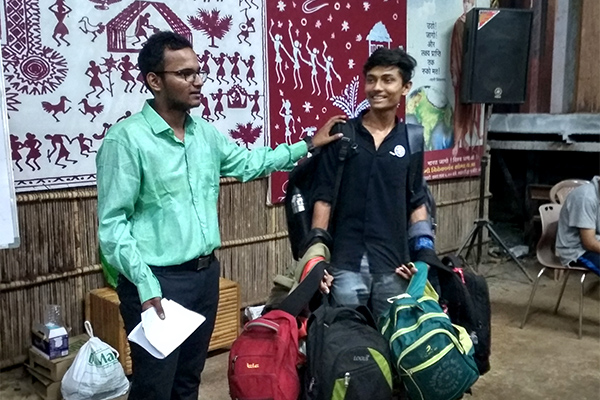 After the street-play training, Bhavin wrote a street play which had humour because “it helps to get the message across to different people without hurting them.” He also conducted short sessions in his own college and one other college. He has also used some of the interactive activities from MAVA training for his gender equality sessions for school children.
After the street-play training, Bhavin wrote a street play which had humour because “it helps to get the message across to different people without hurting them.” He also conducted short sessions in his own college and one other college. He has also used some of the interactive activities from MAVA training for his gender equality sessions for school children.
“My experience with MAVA has led me to my real goal, to work for community development. I want to find out ways of bringing about change. After completing graduation I want to join social work training or an NGO. My uncles tell me that I should do ‘Good for society’ only after I have earned money and taken care of my family. But I don’t want to wait till I am old”, Bhavin said excitedly. “I want the next generation to have a good environment to grow up. I want my daughter and others’ daughters to be safe, healthy and happy. They should not face violence and discrimination. I have seen a lot of gender violence in the area. where I live and it is common in all castes and communities. I want to build peace between different communities. I want to see respect for all religions just like my mother does. This is my vision of community change and gender equality”.
Story 24
Vivek Chavan
Being Equipped to communicate at ease on gender
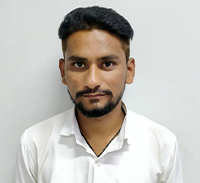 24 year old Vivek is the eldest among the three siblings in the small family living in Shirpur town. Having completed his 12th class in science stream, Vivek joined the five year Masters in Computer Application (MCA) course and was studying at Institute for Management Research and Development (IMRD), Shirpur. In his first year in 2015, his teacher asked him and three others to participate in MAVA’s four-day training programme on Gender. At first he wondered why he was participating as the training was not related to his syllabus. Later he realized its importance; how respecting women and treating them as equals at all levels was close to his real life situations and questions in mind.
24 year old Vivek is the eldest among the three siblings in the small family living in Shirpur town. Having completed his 12th class in science stream, Vivek joined the five year Masters in Computer Application (MCA) course and was studying at Institute for Management Research and Development (IMRD), Shirpur. In his first year in 2015, his teacher asked him and three others to participate in MAVA’s four-day training programme on Gender. At first he wondered why he was participating as the training was not related to his syllabus. Later he realized its importance; how respecting women and treating them as equals at all levels was close to his real life situations and questions in mind.
He had since then attended two other trainings organized by MAVA and learnt many more things, like communicating better and conducting street plays. During the trainings, he agreed with the resource persons’ perspective and was ready to propagate “no abuse and violence against women”. What he did not agree was that women are always right and men always wrong. He felt that “the society has changed and we need to accept that there are some women who are also abusive and violent.”
When asked “what was the most important learning from the series of trainings with MAVA”, he said, “for the first time I felt comfortable being around girls, talking easily with girls who were not family”. His awkwardness was lessened during the discussions on the street-play script which involved girls. Since then, his group of friends consists of boys and girls. His girlfriends trusted him during industrial visits and share personal issues with him comfortably.
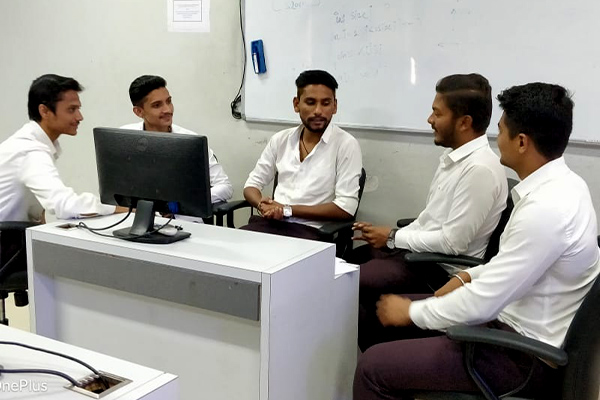 He has been sharing his learnings from MAVA with his classmates as well as his younger brother. They all feel he has changed quite a bit. His mother likes it when he does housework regularly now and his father also appreciates it. When the family had shifted to town area, his mother had made changes in the traditional norms like sitting away during menstruation. After MAVA, Vivek now understands the importance of this change much more and feels his sister and future wife also should not follow it.
He has been sharing his learnings from MAVA with his classmates as well as his younger brother. They all feel he has changed quite a bit. His mother likes it when he does housework regularly now and his father also appreciates it. When the family had shifted to town area, his mother had made changes in the traditional norms like sitting away during menstruation. After MAVA, Vivek now understands the importance of this change much more and feels his sister and future wife also should not follow it.
He has been participating in MAVA activities quite actively. He is part of the small team that has been conducting brief gender sessions in the colleges. He also helped in organizing the film festival on gender issues in his college. About training sessions, he feels these topics are new to the college youth and some appreciate them. More students can be enticed if street- plays are conducted regularly. He expressed his admiration for his college teachers and the Director as they have provided an open environment for boys and girls to interact freely. On the personal level, he would like to undergo some more trainings to feel more confident while talking about concepts such as patriarchy.
About using gender training in his career in the IT sector, he feels that the presence of more females in the sector will provide him with the opportunity to showcase his gender sensitivity to them. He adds, “I am not thinking of marriage yet, but I am sure that I will be able to be more sensitive to the needs of my future partner”.
Story 25
Akash Jain
Dreaming of a family based on Equality
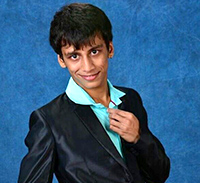 Akash Jain, a 19 plus youth, studying for his graduation in Information Technology had planned about how he will have a gender-equal and loving family and about how he will be a real partner to his wife. What has helped Akash attain clarity on an important aspect of life, generally neglected by the career focused youth, is his association with MAVA since 2014.
Akash Jain, a 19 plus youth, studying for his graduation in Information Technology had planned about how he will have a gender-equal and loving family and about how he will be a real partner to his wife. What has helped Akash attain clarity on an important aspect of life, generally neglected by the career focused youth, is his association with MAVA since 2014.
For Akash, who found love and encouragement only from his 85-year old grandmother, having a close knit family is a very important feature of his future life. As a two-year old, he had lost his parents in an accident and was brought up by his grandparents. Akash had in his growing years learnt to be self-dependent, helping his grandparents in household chores and managing his studies.
As a student of Kirti College, he joined the NSS unit in 2014, where he was introduced to MAVA. He was the only one willing to go for the residential camp organized by MAVA. He had thought it would be fun as he would get to make new friends. He got much more than that. Akash realized that there was so much new information that he was missing. He also saw how other youth were thinking on so many gender, relationship, and sexuality issues and expressing it freely.
He totally agreed with the MAVA resource-persons that women have the capacity to do equal amount of work as he had seen his grandmother who was illiterate, manage the family property alone quite well after his grandfather died. During the training Akash questioned why girls should not be given equal opportunities to study, work, live their life without shame (during menstruation); why they were forced to do or not to do something. Akash himself had not made friends with girls so far as he did not like what his neighbors and friends used to tell him; “boys must prove to be men by having many girl friends”, “just have physical relations with the girls and there is no need to be good to them”.
He quite liked and agreed with the messages at MAVA camps, that girls are equal and we should treat them as such, even after marriage. “When we start interactions with girls, there can certainly be admiration for her beauty and her behavior but there should also be respect. So we should not make them feel uncomfortable with our words and behavior…, we should accept when they say no”, was his summation.
Although his new college does not coordinate with MAVA, Akash has kept in touch with MAVA team and volunteers enthusiastically for MAVA programmes. He says, he would like to share what he has learnt with MAVA with many youth, through new audio-visual and technical formats like social media.





 Amol joined the MAVA youth mentoring project Yuva Maitri in Pune in 2006, but much later than his other classmate friends, Sunil, and Vijay. This was because he generally did not have the time to do anything else apart from farm work and college study. He helped his mother to manage their 3-acre agricultural land and milk the cows, before and after college. His elder brother and sister lived in Pune city for their education with their father who was a rickshaw driver. Amol stayed in the village with his mother and completed graduation at the taluka-level college.
Amol joined the MAVA youth mentoring project Yuva Maitri in Pune in 2006, but much later than his other classmate friends, Sunil, and Vijay. This was because he generally did not have the time to do anything else apart from farm work and college study. He helped his mother to manage their 3-acre agricultural land and milk the cows, before and after college. His elder brother and sister lived in Pune city for their education with their father who was a rickshaw driver. Amol stayed in the village with his mother and completed graduation at the taluka-level college. has been associated with MAVA as a Senior Mentor), met peers from groups like Rashtriya Seva Dal (Rashtriya Seva Dal, formed in 1941 by socialists to ensure justice, liberty, equality and fraternity.) and NGOs like MASUM (MASUM- Mahila Sarvangin Utkarsh Mandal, an NGO based in Pune district, works with a feminist perspective and a human rights approach to village development). He participated in a massive protest campaign against the rape of a woman in a neighbouring town, performed in street plays, especially one titled Dhokyachi Ghanta (Warning Bell) on declining sex ratio, and travelled with the “Bell Bajao campaign in select districts run by Breakthrough TV.
Amol had found his path ahead. He joined Masters in Social Work (MSW) with monetary support from some of his new found friends in MAVA and in the second year took up a job in an HIV/AIDS project to sustain himself. When he completed MSW in 2010, he got a job of training children and adolescents in sex education and gender equality. In the meantime, he continued his association with MAVA. Whenever there was an opportunity, Amol volunteered with MAVA, thus continually enriching himself and enhancing his multiple skills including leadership and team-building.
has been associated with MAVA as a Senior Mentor), met peers from groups like Rashtriya Seva Dal (Rashtriya Seva Dal, formed in 1941 by socialists to ensure justice, liberty, equality and fraternity.) and NGOs like MASUM (MASUM- Mahila Sarvangin Utkarsh Mandal, an NGO based in Pune district, works with a feminist perspective and a human rights approach to village development). He participated in a massive protest campaign against the rape of a woman in a neighbouring town, performed in street plays, especially one titled Dhokyachi Ghanta (Warning Bell) on declining sex ratio, and travelled with the “Bell Bajao campaign in select districts run by Breakthrough TV.
Amol had found his path ahead. He joined Masters in Social Work (MSW) with monetary support from some of his new found friends in MAVA and in the second year took up a job in an HIV/AIDS project to sustain himself. When he completed MSW in 2010, he got a job of training children and adolescents in sex education and gender equality. In the meantime, he continued his association with MAVA. Whenever there was an opportunity, Amol volunteered with MAVA, thus continually enriching himself and enhancing his multiple skills including leadership and team-building. Suraj had succeeded in the competitive admission process at Tata Institute of Social Sciences and was the only male to get entry in the Women-Centred Practice Class. He was placed at MAVA for field-work exposure as a student during his first year. He found MAVA’s vision and mission unique. As a student trainee, he got exposure to all the trainings, campaigns, and mass awareness events as well as opportunity to read and enhance his knowledge and perspective. Suraj said, “After MAVA’s training my perspective towards society changed and I started finding out gender biases within and around me. I learnt that as a male in the society I have so many privileges which I can undo for shaping a gender-equal society.”
He observed the orientation and training sessions and read all the available materials at MAVA. After a few weeks, he was made a co-trainer, which turned out to be very helpful. He could learn different methods and strategies to communicate ideas on gender issues with youth from senior trainers and experts. Later on, he got several opportunities to take interactive sessions in colleges located in Mumbai, Navi Mumbai, Thane districts. The exposure to different activities of MAVA made Suraj realize that he liked being a trainer on gender issues through a two-way dialogue that enriched him immensely.
Suraj had succeeded in the competitive admission process at Tata Institute of Social Sciences and was the only male to get entry in the Women-Centred Practice Class. He was placed at MAVA for field-work exposure as a student during his first year. He found MAVA’s vision and mission unique. As a student trainee, he got exposure to all the trainings, campaigns, and mass awareness events as well as opportunity to read and enhance his knowledge and perspective. Suraj said, “After MAVA’s training my perspective towards society changed and I started finding out gender biases within and around me. I learnt that as a male in the society I have so many privileges which I can undo for shaping a gender-equal society.”
He observed the orientation and training sessions and read all the available materials at MAVA. After a few weeks, he was made a co-trainer, which turned out to be very helpful. He could learn different methods and strategies to communicate ideas on gender issues with youth from senior trainers and experts. Later on, he got several opportunities to take interactive sessions in colleges located in Mumbai, Navi Mumbai, Thane districts. The exposure to different activities of MAVA made Suraj realize that he liked being a trainer on gender issues through a two-way dialogue that enriched him immensely. His father’s word was ‘the law’ in his family. Suraj was taught that doing good deeds and following the religious path would earn him ‘punya’. After 12th standard he was sent him to Pune to pursue a graduation in Commerce. Suraj took help from family friends to set up base in the new city. He recalls he was staying in a Hindu temple with a priest and he was expected to do all the temple chores like cleaning the place, reciting shlokas, reading religious texts, be a strict vegetarian, practice yoga, etc. In return he was paid Rs. 700 and got free lodging and boarding.
His father’s word was ‘the law’ in his family. Suraj was taught that doing good deeds and following the religious path would earn him ‘punya’. After 12th standard he was sent him to Pune to pursue a graduation in Commerce. Suraj took help from family friends to set up base in the new city. He recalls he was staying in a Hindu temple with a priest and he was expected to do all the temple chores like cleaning the place, reciting shlokas, reading religious texts, be a strict vegetarian, practice yoga, etc. In return he was paid Rs. 700 and got free lodging and boarding.  Sunil Chachar, hailing from a small village, in Pune district, believes he is a die-hard trainer, “For training, if you wake me up in the middle of the night or even when I am not well, I will be ready… any time, any group, anywhere”, says Sunil for whom, all social problems start and end with gender inequality.
Sunil Chachar, hailing from a small village, in Pune district, believes he is a die-hard trainer, “For training, if you wake me up in the middle of the night or even when I am not well, I will be ready… any time, any group, anywhere”, says Sunil for whom, all social problems start and end with gender inequality.  This was one of the most important lessons he learned he says, and “it is useful even today when I conduct awareness sessions because the root causes of gender inequality have not changed ...”. They were also trained in writing simple songs and street plays, singing motivational songs developed by activists. He was one of the few peer communicators who kept a diary, as advised by Harish Sir - a journal of all the takeaway messages, queries, and self- reflections from the training sessions. This is his ‘treasure box’, which he opens when he has to conduct a challenging training session, even today.
This was one of the most important lessons he learned he says, and “it is useful even today when I conduct awareness sessions because the root causes of gender inequality have not changed ...”. They were also trained in writing simple songs and street plays, singing motivational songs developed by activists. He was one of the few peer communicators who kept a diary, as advised by Harish Sir - a journal of all the takeaway messages, queries, and self- reflections from the training sessions. This is his ‘treasure box’, which he opens when he has to conduct a challenging training session, even today. Yogesh Kamble comes from a family of teachers - his grandfather father, sister, uncles and cousins taught in local schools and colleges. When Yogesh’s father passed away, his mother who had studied up to primary school got the job as a peon in the school where his father was working. Yogesh was only 2 ½ years old at that time. His mother who had to manage all the responsibilities of the family also managed to give all of her four children, two boys, and 2 girls, a graduate-level education. This was despite the fact the high school and college were located quite far from the village.
Yogesh Kamble comes from a family of teachers - his grandfather father, sister, uncles and cousins taught in local schools and colleges. When Yogesh’s father passed away, his mother who had studied up to primary school got the job as a peon in the school where his father was working. Yogesh was only 2 ½ years old at that time. His mother who had to manage all the responsibilities of the family also managed to give all of her four children, two boys, and 2 girls, a graduate-level education. This was despite the fact the high school and college were located quite far from the village. Another of his personal change plans was to share his views without inhibitions and discuss sensitive issues with friends. These changes in a shy, ‘keeping to himself’ Yogesh were noticed and welcomed by his family, neighbours and friends.
They have now become part of his personality.
Another of his personal change plans was to share his views without inhibitions and discuss sensitive issues with friends. These changes in a shy, ‘keeping to himself’ Yogesh were noticed and welcomed by his family, neighbours and friends.
They have now become part of his personality.  For Vijay’s family which had 3 ½ acres rain-fed agricultural land, education was a way out of poverty and caste based livelihood. His father who was a matriculate pass, owned a hair saloon in the village. Vijay and his two sisters were given higher education despite financial crises arising due to his father’s accident.
For Vijay’s family which had 3 ½ acres rain-fed agricultural land, education was a way out of poverty and caste based livelihood. His father who was a matriculate pass, owned a hair saloon in the village. Vijay and his two sisters were given higher education despite financial crises arising due to his father’s accident.  With an MSW degree from Yeshwantrao Chavan School of Social Work, Satara, in hand, Dhananjay was appointed as Coordinator for MAVA project Maanush on Gender Equality. Coming from a marginal farmer’s family, Dhananjay had worked his way through college. After studying in the village till 4th standard, Dhananjay used to walk or cycle to reach his school and junior college. Later on, his village was granted a graduation college and he could attain his bachelor’s degree in social work locally. Unfortunately, he could not continue towards a master’s degree in social work immediately as cash flow was limited in the family. His brother had joined the military after 12th class and his two sisters were married off early. Dhananjay took up a door-to-door sales job and worked on construction sites during summers for generating income. This helped him to save up some amount for post- graduation fees. Later it was supplemented by a small fellowship from a government agency.
With an MSW degree from Yeshwantrao Chavan School of Social Work, Satara, in hand, Dhananjay was appointed as Coordinator for MAVA project Maanush on Gender Equality. Coming from a marginal farmer’s family, Dhananjay had worked his way through college. After studying in the village till 4th standard, Dhananjay used to walk or cycle to reach his school and junior college. Later on, his village was granted a graduation college and he could attain his bachelor’s degree in social work locally. Unfortunately, he could not continue towards a master’s degree in social work immediately as cash flow was limited in the family. His brother had joined the military after 12th class and his two sisters were married off early. Dhananjay took up a door-to-door sales job and worked on construction sites during summers for generating income. This helped him to save up some amount for post- graduation fees. Later it was supplemented by a small fellowship from a government agency.  He further recalls how the group had set up a question-answer session with the local police, organized a candle march and other forms of protests against violence against women, and put up wallpapers in colleges, shops, police stations. Unfortunately, this high–energy MAVA phase had to be stopped and handed over to another coordinator as Dhananjay had to once again shift base with his family.
He further recalls how the group had set up a question-answer session with the local police, organized a candle march and other forms of protests against violence against women, and put up wallpapers in colleges, shops, police stations. Unfortunately, this high–energy MAVA phase had to be stopped and handed over to another coordinator as Dhananjay had to once again shift base with his family.
 Sushant prefers not to write merely his family name. He is proud of his parents and writes their name (father and mother’s) in all of his working documents. His parents though uneducated, never said ‘NO’ to his aspirations. The only limitation was money. Born as a second son in a mathadi (head-loader) worker’s family living in Mumbai, Sushant grew up facing financial difficulties. While his father’s income was just about sufficient for day-to-day living, his brother and he took up odd jobs, like car wash, pet care, to contribute to the family’s income. Later his brother became a driver and had a substantial income to help Sushant complete his education. Sushant joined the Bombay Sarvodaya Mandal, a Gandhian NGO, where he worked for 4 years earning a small salary. This was good enough for Sushant as he had found Gandhian values more important than getting more income. To a question, why he thought differently from the other boys his age, Sushant said, “When you live in poor conditions, you see good and bad, and decide what you want to do.”
Sushant prefers not to write merely his family name. He is proud of his parents and writes their name (father and mother’s) in all of his working documents. His parents though uneducated, never said ‘NO’ to his aspirations. The only limitation was money. Born as a second son in a mathadi (head-loader) worker’s family living in Mumbai, Sushant grew up facing financial difficulties. While his father’s income was just about sufficient for day-to-day living, his brother and he took up odd jobs, like car wash, pet care, to contribute to the family’s income. Later his brother became a driver and had a substantial income to help Sushant complete his education. Sushant joined the Bombay Sarvodaya Mandal, a Gandhian NGO, where he worked for 4 years earning a small salary. This was good enough for Sushant as he had found Gandhian values more important than getting more income. To a question, why he thought differently from the other boys his age, Sushant said, “When you live in poor conditions, you see good and bad, and decide what you want to do.”  After that MAVA camp, I started washing my own food plate and tiffin box. My perspective about girls changed. I developed greater sensitivity and respect towards them. I realized that there are small things that one can start doing for treating women in our lives with respect and equality. These ideas have stayed with me and these are my learnings for life.”
After that MAVA camp, I started washing my own food plate and tiffin box. My perspective about girls changed. I developed greater sensitivity and respect towards them. I realized that there are small things that one can start doing for treating women in our lives with respect and equality. These ideas have stayed with me and these are my learnings for life.”  Born and brought up in a middle-class suburb in Mumbai, Sumit’s exposure to radical ideas due to his social work education is like a building block to his extra-curricular social activities in school and NSS activities in junior college. He put his whole heart whether it was shramdaan (voluntary work) or working at the leprosy hospital near Mumbai. He was an active student representative with a readiness to initiate changes from his level. Knowing his penchant for community work, his mentor in college guided him in taking up the less known graduation in social work education as she herself was doing it. While studying for his Bachelor’s degree in Social Work (BSW) in Mumbai, Rahul excelled as an organizer, presenter and mentor. He was a Special Cell representative at the university level.
Born and brought up in a middle-class suburb in Mumbai, Sumit’s exposure to radical ideas due to his social work education is like a building block to his extra-curricular social activities in school and NSS activities in junior college. He put his whole heart whether it was shramdaan (voluntary work) or working at the leprosy hospital near Mumbai. He was an active student representative with a readiness to initiate changes from his level. Knowing his penchant for community work, his mentor in college guided him in taking up the less known graduation in social work education as she herself was doing it. While studying for his Bachelor’s degree in Social Work (BSW) in Mumbai, Rahul excelled as an organizer, presenter and mentor. He was a Special Cell representative at the university level. Umesh belongs to an agricultural family of 8 members, with 5 children. It owns 4 acres of land where they grow cotton and soyabean. The two elder sisters were married after they turned 18. One of his brothers is a gram sevak (government recognized village social worker). Since his uncle is a trained social worker ( done his MSW), Umesh thought of doing social work training as he can get a decent job as well as work for the welfare of his society.
Umesh belongs to an agricultural family of 8 members, with 5 children. It owns 4 acres of land where they grow cotton and soyabean. The two elder sisters were married after they turned 18. One of his brothers is a gram sevak (government recognized village social worker). Since his uncle is a trained social worker ( done his MSW), Umesh thought of doing social work training as he can get a decent job as well as work for the welfare of his society.  Umesh said, their group tried performing a street play on HIV/AIDS. After that they were given a four-day communication skills training and later on a 4-day street play training. They also received a booklet “Hey sare mala maahit havey”(I should know all this) which has complete scientific information on sexuality.
Umesh said, their group tried performing a street play on HIV/AIDS. After that they were given a four-day communication skills training and later on a 4-day street play training. They also received a booklet “Hey sare mala maahit havey”(I should know all this) which has complete scientific information on sexuality. As a growing village teenager who got very little exposure to the outside world, Amit had watched with great interest the street plays on gender-discrimination, that were performed during Ganapati festival in his village. He met Mayur, the coordinator of Maanush project, when he was studying in First Year Bachelors in Arts and got an inkling of what some of the senior boys in his village were doing; meeting in small groups, discussing with some outsiders, and performing plays.
As a growing village teenager who got very little exposure to the outside world, Amit had watched with great interest the street plays on gender-discrimination, that were performed during Ganapati festival in his village. He met Mayur, the coordinator of Maanush project, when he was studying in First Year Bachelors in Arts and got an inkling of what some of the senior boys in his village were doing; meeting in small groups, discussing with some outsiders, and performing plays.  Amit also recalled how he has seen college-mates tease girls standing at the bus stop, or walking on the road. And he could not stop them. This incident became one of the major reasons that Amit started exploring the medium of street plays as it could help to discuss male behaviours that are hard to change. The street play workshop had opened a new space for Amit. He was involved in the writing of a street play on gender and HIV/ AIDS, which was later on performed in different parts of Maharashtra. This made him realize the power of media to question traditional norms and present new thoughts. Amit had found his sphere of control.
Amit also recalled how he has seen college-mates tease girls standing at the bus stop, or walking on the road. And he could not stop them. This incident became one of the major reasons that Amit started exploring the medium of street plays as it could help to discuss male behaviours that are hard to change. The street play workshop had opened a new space for Amit. He was involved in the writing of a street play on gender and HIV/ AIDS, which was later on performed in different parts of Maharashtra. This made him realize the power of media to question traditional norms and present new thoughts. Amit had found his sphere of control.  21 year old Abhijeet is presently occupied with two things – doing his masters in sociology and completing an advanced course in animation. The first one is to keep his parents happy and the second one is to fulfill his creative instincts and talent in cartooning and animation. His family consisting of both parents and a younger sister and the family runs mainly on the income generated from tailoring done mainly by his father. Their 5 acre agricultural land is in Buldhana, native village from where they migrated, and is being managed by his grandfather.
21 year old Abhijeet is presently occupied with two things – doing his masters in sociology and completing an advanced course in animation. The first one is to keep his parents happy and the second one is to fulfill his creative instincts and talent in cartooning and animation. His family consisting of both parents and a younger sister and the family runs mainly on the income generated from tailoring done mainly by his father. Their 5 acre agricultural land is in Buldhana, native village from where they migrated, and is being managed by his grandfather. He started using what he had learnt at MAVA sessions by doing some of the housework. Sometimes his mother objected and sometimes he persisted. For example, he has been including his mother’s name while writing his name, despite a few classmates jeering him. Although he has not shared with his sister about what he has been learning in MAVA sessions, he is planning to share the MAVA booklet with his sister after her exams.
He started using what he had learnt at MAVA sessions by doing some of the housework. Sometimes his mother objected and sometimes he persisted. For example, he has been including his mother’s name while writing his name, despite a few classmates jeering him. Although he has not shared with his sister about what he has been learning in MAVA sessions, he is planning to share the MAVA booklet with his sister after her exams.  As a child, Ganesh had not liked going to school. Although the School Principal was a kind-hearted man, he found most of the teachers to be quite acerbic. They would never miss an opportunity to taunt him about “my kind of children” being given what they did not deserve and could not appreciate. He had very few friends in school and he was relieved to return to his home located in an overcrowded, industrial belt in a suburban area. Ganesh was quite an irregular student at school and college and he found himself either changing streams or taking breaks from academics, getting into odd jobs and finding himself dissatisfied with those jobs. After several ups and downs, he joined a night college, so that he could earn and learn at the same time. That’s where he got the opportunity to become part of the MAVA mentoring programme.
As a child, Ganesh had not liked going to school. Although the School Principal was a kind-hearted man, he found most of the teachers to be quite acerbic. They would never miss an opportunity to taunt him about “my kind of children” being given what they did not deserve and could not appreciate. He had very few friends in school and he was relieved to return to his home located in an overcrowded, industrial belt in a suburban area. Ganesh was quite an irregular student at school and college and he found himself either changing streams or taking breaks from academics, getting into odd jobs and finding himself dissatisfied with those jobs. After several ups and downs, he joined a night college, so that he could earn and learn at the same time. That’s where he got the opportunity to become part of the MAVA mentoring programme. The discussions on gender equality and men’s role in bringing about a change prompted Ganesh to apply it in his everyday life. He started by washing his own plate after food at home. Gradually he started helping his mother at home with some chores that he could manage after returning home, listened to what his mother had to say on family matters, and watched the ‘Sakhi’ programme on Sahyadri channel1 with them. This made him more aware about the major problems faced by women in Maharashtra.
When Ganesh discussed changing male behaviours with some of his women relatives, they were sceptical “men will never give up their powers handed to them over generations”. He also tried discussing MAVA information with his friends in the neighbourhood, but they were not ready to accept these thoughts. He realized that it is difficult for them to understand the concept of equality as they have not been exposed to any in-depth training like he had, or exposed to any equal treatment in society. When some friends ask him for advice, he is ready to do so. His mobile is constantly busy with friends seeking help and guidance. Most of the time his advice to them is, “spend more on education and less on girl-friends, marriage ceremonies and religious activities”.
The discussions on gender equality and men’s role in bringing about a change prompted Ganesh to apply it in his everyday life. He started by washing his own plate after food at home. Gradually he started helping his mother at home with some chores that he could manage after returning home, listened to what his mother had to say on family matters, and watched the ‘Sakhi’ programme on Sahyadri channel1 with them. This made him more aware about the major problems faced by women in Maharashtra.
When Ganesh discussed changing male behaviours with some of his women relatives, they were sceptical “men will never give up their powers handed to them over generations”. He also tried discussing MAVA information with his friends in the neighbourhood, but they were not ready to accept these thoughts. He realized that it is difficult for them to understand the concept of equality as they have not been exposed to any in-depth training like he had, or exposed to any equal treatment in society. When some friends ask him for advice, he is ready to do so. His mobile is constantly busy with friends seeking help and guidance. Most of the time his advice to them is, “spend more on education and less on girl-friends, marriage ceremonies and religious activities”. Nisaar came to MAVA with a strong dalit movement background. At the age of 29, he had published his collection of poems, 'Mhatari Melyache Dukkha Nahi' and was a regular contributor to a radical magazine, Vidrohi1. He had much experience working with marginalized groups and had joined the Masters programme to study in Dalit and Tribal issues at Tata Institute of Social Sciences. In the first year, he was placed for year-long field work with MAVA.
Nisaar came to MAVA with a strong dalit movement background. At the age of 29, he had published his collection of poems, 'Mhatari Melyache Dukkha Nahi' and was a regular contributor to a radical magazine, Vidrohi1. He had much experience working with marginalized groups and had joined the Masters programme to study in Dalit and Tribal issues at Tata Institute of Social Sciences. In the first year, he was placed for year-long field work with MAVA.  Nisaar’s first exposure to MAVA’s residential training was the one organized for college youth from Mumbai. He said, that it was useful for getting a better understanding of the close linkage between patriarchy, masculinity, social institutions, like family, religion, education, politics and media, and gender issues. During the training, Nisaar saw how the resource persons made learning the topics interesting. He recalled how one resource person made the students play a game which showed in a simple but clear manner the close interlinkage between caste, class and gender inequalities. Another interactive teaching activity useful in clarifying the concepts of naturally defined and socially construction of gender was the ‘12 sentences activity’. “These sentences can confuse even those who are well-read and make you think really deeply and clarify many nuances of gender in a real sense.”
Nisaar’s first exposure to MAVA’s residential training was the one organized for college youth from Mumbai. He said, that it was useful for getting a better understanding of the close linkage between patriarchy, masculinity, social institutions, like family, religion, education, politics and media, and gender issues. During the training, Nisaar saw how the resource persons made learning the topics interesting. He recalled how one resource person made the students play a game which showed in a simple but clear manner the close interlinkage between caste, class and gender inequalities. Another interactive teaching activity useful in clarifying the concepts of naturally defined and socially construction of gender was the ‘12 sentences activity’. “These sentences can confuse even those who are well-read and make you think really deeply and clarify many nuances of gender in a real sense.” Tanaji, belongs to a small village, Dele, with a population of a thousand people, with a primary school, and which lies on the border of Konkan. The children have to go a school far from the village for higher classes. This makes many children, especially girls, drop out of school. Tanaji was one of the few who completed his tenth class by living in a hostel. Becoming a sixteen year old migrant to a mega city, Mumbai, was a painful but a necessary decision for Tanaji. His family consisting of a younger sister, father and mother continue to live off their 4 acres agricultural land.
Tanaji, belongs to a small village, Dele, with a population of a thousand people, with a primary school, and which lies on the border of Konkan. The children have to go a school far from the village for higher classes. This makes many children, especially girls, drop out of school. Tanaji was one of the few who completed his tenth class by living in a hostel. Becoming a sixteen year old migrant to a mega city, Mumbai, was a painful but a necessary decision for Tanaji. His family consisting of a younger sister, father and mother continue to live off their 4 acres agricultural land.  Tanaji’s feelings at the first residential workshop ranged from awe at the information he was receiving, to a feeling of angst that so many like him in his village had not received this information. He wondered why it was difficult for his science teachers to skip the reproductive organs and health chapters in the textbook, making him and many like him go to ‘shady’ sources to find answers. He felt calmed when he found all the resource persons sharing openly and freely scientific knowledge about male and female bodies and sexuality and learnt that menstruation was not a matter of shame but a healthy aspect of women’s body. He said, he was so excited that he asked all his questions and doubts to the resource persons and volunteers. It was a beginning to informal learning many skills like communication, and street-play making.
Tanaji’s feelings at the first residential workshop ranged from awe at the information he was receiving, to a feeling of angst that so many like him in his village had not received this information. He wondered why it was difficult for his science teachers to skip the reproductive organs and health chapters in the textbook, making him and many like him go to ‘shady’ sources to find answers. He felt calmed when he found all the resource persons sharing openly and freely scientific knowledge about male and female bodies and sexuality and learnt that menstruation was not a matter of shame but a healthy aspect of women’s body. He said, he was so excited that he asked all his questions and doubts to the resource persons and volunteers. It was a beginning to informal learning many skills like communication, and street-play making.  Vedprakash Jaiswal, says he is different from other boys in his community. He helps his mother, aunties in his neighbourhood, with water-filling, carrying loads from the bus stop. He does not want to go the same way as the other boys in his area. They are all either gambling, loitering or passing comments on girls. He says vehemently “I don’t want to be like them”. He also agrees with his mother who gets battered by her husband regularly, that he should not grow to be like his father.
Vedprakash Jaiswal, says he is different from other boys in his community. He helps his mother, aunties in his neighbourhood, with water-filling, carrying loads from the bus stop. He does not want to go the same way as the other boys in his area. They are all either gambling, loitering or passing comments on girls. He says vehemently “I don’t want to be like them”. He also agrees with his mother who gets battered by her husband regularly, that he should not grow to be like his father.  Here, Ved along with his community friends met boys like him. There he learned about “how the girls and boys’ body is, how we feel attracted to girls, how we can be abused if we are unaware, about laws that protect children”. He said, Amol Sir and Harish sir took training. They asked us to think about many things like, why there are so many bad words for women, why girls cannot be equal to boys in playing cricket, in studying, working in big companies, how would it feel to be teased like boys tease girls, why boys cannot grow their hair like girls, or wear earrings, necklaces, why we tease people for doing what they like doing”, why films show only some body parts”. They learned about “mardangi” (meaning Masculinity) and how this makes boys behave “badly”.
Here, Ved along with his community friends met boys like him. There he learned about “how the girls and boys’ body is, how we feel attracted to girls, how we can be abused if we are unaware, about laws that protect children”. He said, Amol Sir and Harish sir took training. They asked us to think about many things like, why there are so many bad words for women, why girls cannot be equal to boys in playing cricket, in studying, working in big companies, how would it feel to be teased like boys tease girls, why boys cannot grow their hair like girls, or wear earrings, necklaces, why we tease people for doing what they like doing”, why films show only some body parts”. They learned about “mardangi” (meaning Masculinity) and how this makes boys behave “badly”. Yogesh got oriented to MAVA when he was in his Second Year Bachelors in Arts at a Pune city college in 2006. During one of the extracurricular activities, he became part of a group of students who attended a lecture delivered by Harish Sadani from MAVA, on the need for youth to be aware of the world around them and their role in changing the society. He was extremely impressed, and agreed to participate in a 7-day camp held by MAVA at the Pune University campus. During the camp, he heard a number of resource persons discussing very sensitive topics like body changes during adolescence, sexuality, women's workload, male-female equality in a very interesting manner. He was also impressed by a husband- wife couple (late Dr. Anant and Shanta Sathe) who were experts at guiding young people about family life, marriage and reproductive and sexual health in Pune.
Yogesh got oriented to MAVA when he was in his Second Year Bachelors in Arts at a Pune city college in 2006. During one of the extracurricular activities, he became part of a group of students who attended a lecture delivered by Harish Sadani from MAVA, on the need for youth to be aware of the world around them and their role in changing the society. He was extremely impressed, and agreed to participate in a 7-day camp held by MAVA at the Pune University campus. During the camp, he heard a number of resource persons discussing very sensitive topics like body changes during adolescence, sexuality, women's workload, male-female equality in a very interesting manner. He was also impressed by a husband- wife couple (late Dr. Anant and Shanta Sathe) who were experts at guiding young people about family life, marriage and reproductive and sexual health in Pune.  As a professional in the Information Technology (IT) sector, he found that a substantial number of young women were professionally trained and they worked alongside young men- all were expected to work with ruthless deadlines. He soon realized that the young men had almost the same queries and doubts on gender and relationships. His approachable personality made him a boss who could give sound, unbiased advice. He realized that the women were expected to reach home at a specific time, manage all family responsibilities, etc., which denied them the extra time and energy needed for the new skills training expected from them as a professional. These pressures affected their work output. Since he wanted them to give their best in an unburdened work environment, Yogesh found ways of managing training time and work division without treating them with a chivalrous approach, and being unjust towards the young men in his team. He embedded the themes of gender equality and respect to all, in his discussions on teamwork. When his colleagues, team workers had problems at home or in relationships, they felt relieved to have Yogesh to hear them out and extend his advice.
As a professional in the Information Technology (IT) sector, he found that a substantial number of young women were professionally trained and they worked alongside young men- all were expected to work with ruthless deadlines. He soon realized that the young men had almost the same queries and doubts on gender and relationships. His approachable personality made him a boss who could give sound, unbiased advice. He realized that the women were expected to reach home at a specific time, manage all family responsibilities, etc., which denied them the extra time and energy needed for the new skills training expected from them as a professional. These pressures affected their work output. Since he wanted them to give their best in an unburdened work environment, Yogesh found ways of managing training time and work division without treating them with a chivalrous approach, and being unjust towards the young men in his team. He embedded the themes of gender equality and respect to all, in his discussions on teamwork. When his colleagues, team workers had problems at home or in relationships, they felt relieved to have Yogesh to hear them out and extend his advice.  Sarath belongs to a nuclear middle class family. His father is a postgraduate and has a travel agency. His mother is a graduate in Music studies and takes dance and music classes. His younger sister is a trained dancer, is busy studying college as well as doing dance recitals. She was awarded membership to the UNESCO’s International Dance Council, informs Sarath proudly.
Sarath belongs to a nuclear middle class family. His father is a postgraduate and has a travel agency. His mother is a graduate in Music studies and takes dance and music classes. His younger sister is a trained dancer, is busy studying college as well as doing dance recitals. She was awarded membership to the UNESCO’s International Dance Council, informs Sarath proudly.  February - March 2017, just before his final MSW exam, was a hectic time for Ravi. He was actively participating in several programmes held by his college and NGOs in Mumbai; a Bollywood song tweaking competition organized by Akshara 1, a human chain against violence and abuse of women on International Women’s Day, a ‘Making Mumbai’ campaign with YUVA2 , a State-Level competition ‘Transform Maharashtra’ with his college team Parivartan, encouraging citizens to vote during the elections. All this activity kept Ravi happy and satisfied, as he is one who craves for action-oriented social work. Ravi’s ‘energy’ for participating in social development activities is much envied among his social work friends. Revealing his secret, Ravi said, he had undergone a Vipassana3 camp, where he learnt to ‘center’, and stabilize his thoughts, reflect on issues and find solutions. He says it has helped him a lot as socio-economic problems have challenged him often and he has had to find ways to resolve them. Ravi has been able to find his solutions, whether it was getting financial support for a laptop or networking with Assam groups for his placement or getting a Community Connect Fellowship.
February - March 2017, just before his final MSW exam, was a hectic time for Ravi. He was actively participating in several programmes held by his college and NGOs in Mumbai; a Bollywood song tweaking competition organized by Akshara 1, a human chain against violence and abuse of women on International Women’s Day, a ‘Making Mumbai’ campaign with YUVA2 , a State-Level competition ‘Transform Maharashtra’ with his college team Parivartan, encouraging citizens to vote during the elections. All this activity kept Ravi happy and satisfied, as he is one who craves for action-oriented social work. Ravi’s ‘energy’ for participating in social development activities is much envied among his social work friends. Revealing his secret, Ravi said, he had undergone a Vipassana3 camp, where he learnt to ‘center’, and stabilize his thoughts, reflect on issues and find solutions. He says it has helped him a lot as socio-economic problems have challenged him often and he has had to find ways to resolve them. Ravi has been able to find his solutions, whether it was getting financial support for a laptop or networking with Assam groups for his placement or getting a Community Connect Fellowship.  In the first year, the students had to do internship and Ravi was assigned MAVA. As a product of a society where women are taken for granted, Ravi found himself moving in the opposite direction very soon. He liked the MAVA idea of working with men a unique one. This novelty made him work hard to understand MAVA’s philosophy. The simple language used by Harish Sir made him understand much of it. When he was unable to grasp some ideas and concepts, he would request Harish to explain it further. All these formal and informal sessions and mentoring situations helped Ravi a lot.
In the first year, the students had to do internship and Ravi was assigned MAVA. As a product of a society where women are taken for granted, Ravi found himself moving in the opposite direction very soon. He liked the MAVA idea of working with men a unique one. This novelty made him work hard to understand MAVA’s philosophy. The simple language used by Harish Sir made him understand much of it. When he was unable to grasp some ideas and concepts, he would request Harish to explain it further. All these formal and informal sessions and mentoring situations helped Ravi a lot.  Mayur was 25, had completed his MSW from Yeshwantrao Chavan School of Social Work, Satara, and was looking out for a job. Coming from a family of agriculturists, (his father and one of his brothers are farmers), there was an unstated pressure on Mayur to find a job as soon as possible. In 2010, Shramik Janata Vikas Sanstha, an NGO offered him the post of a project coordinator for MAVA’s Manush project, when the previous coordinator, Dhananjay was leaving. As a student social worker, Mayur had not given much thought and importance to gender issues. Moreover, he thought he was not a person who could talk about sensitive issues like sexuality. He recalls how he took up the job with a feeling that if he could not handle it, he would quit and look out for another job.
Mayur was 25, had completed his MSW from Yeshwantrao Chavan School of Social Work, Satara, and was looking out for a job. Coming from a family of agriculturists, (his father and one of his brothers are farmers), there was an unstated pressure on Mayur to find a job as soon as possible. In 2010, Shramik Janata Vikas Sanstha, an NGO offered him the post of a project coordinator for MAVA’s Manush project, when the previous coordinator, Dhananjay was leaving. As a student social worker, Mayur had not given much thought and importance to gender issues. Moreover, he thought he was not a person who could talk about sensitive issues like sexuality. He recalls how he took up the job with a feeling that if he could not handle it, he would quit and look out for another job. As the coordinator, his main task was to create a pool of young male communicators from the villages, who would address issues of gender-based discrimination and violence in the villages. Through group discussions, games, information sharing, Mayur encouraged them to work with MAVA to pass on the message of non- discrimination and gender equality in the neighbouring villages. They were guided into doing rapid surveys, trained in communication skills and mass awareness generation on topical gender issues.
As the coordinator, his main task was to create a pool of young male communicators from the villages, who would address issues of gender-based discrimination and violence in the villages. Through group discussions, games, information sharing, Mayur encouraged them to work with MAVA to pass on the message of non- discrimination and gender equality in the neighbouring villages. They were guided into doing rapid surveys, trained in communication skills and mass awareness generation on topical gender issues. He said women have low status in our society. Due to HIV, they are treated worse than the lowest in the community. Mayur was expected to do interventions regarding appropriate health services, individual and family counseling and awareness generation. He recalls, “I went beyond the defined role as I took on dealing with their issues from a gender perspective… I understood their fears and tensions and helped their families to understand it as well and create a positive environment.”
He said women have low status in our society. Due to HIV, they are treated worse than the lowest in the community. Mayur was expected to do interventions regarding appropriate health services, individual and family counseling and awareness generation. He recalls, “I went beyond the defined role as I took on dealing with their issues from a gender perspective… I understood their fears and tensions and helped their families to understand it as well and create a positive environment.” Deepak is presently working with a domestic workers union Maharashtra Gharelu Kamgar Union, in central Mumbai. As a growing boy Deepak had found support from civil society groups like Sathi Chandubhai Mehta Samaj Seva Pratishthan, located in the neighborhood. Here the children are given support for education, training for skill-building, communication, awareness building, leadership, and social service. This was one of the saving graces in Deepak’s life.
Deepak is presently working with a domestic workers union Maharashtra Gharelu Kamgar Union, in central Mumbai. As a growing boy Deepak had found support from civil society groups like Sathi Chandubhai Mehta Samaj Seva Pratishthan, located in the neighborhood. Here the children are given support for education, training for skill-building, communication, awareness building, leadership, and social service. This was one of the saving graces in Deepak’s life.  He was so awed by the information and perspective received from MAVA that he shared it with his mother and sister. After a number of discussions and arguments with his mother and sister on the traditional versus new ideas and views, Deepak could see them gradually getting convinced and freeing themselves from the traditional thought. For example, his sister started participating actively in family decisions. She was able to marry a man of her choice although he belonged to a different religious community. His mother supported her decision despite opposition from relatives. His mother also divided her property between both her children equally. Deepak encourages his mother to guide other women in the community on issues like getting their names on ration cards, giving education and skills to girls, fighting back domestic violence and their legal rights. He would like his mother to break totally away from the relatives who do not show her much respect. But his mother does not agree.
He was so awed by the information and perspective received from MAVA that he shared it with his mother and sister. After a number of discussions and arguments with his mother and sister on the traditional versus new ideas and views, Deepak could see them gradually getting convinced and freeing themselves from the traditional thought. For example, his sister started participating actively in family decisions. She was able to marry a man of her choice although he belonged to a different religious community. His mother supported her decision despite opposition from relatives. His mother also divided her property between both her children equally. Deepak encourages his mother to guide other women in the community on issues like getting their names on ration cards, giving education and skills to girls, fighting back domestic violence and their legal rights. He would like his mother to break totally away from the relatives who do not show her much respect. But his mother does not agree.  Onil had quit his well-paying job gained through campus placement after doing his Masters in Social Work, as the organisation was not doing what he had thought it would be doing. He could not work with an NGO that did not fulfil its promises to disabled clients. His conscience did not permit him to “take a fat salary and not do social work”.
Onil had quit his well-paying job gained through campus placement after doing his Masters in Social Work, as the organisation was not doing what he had thought it would be doing. He could not work with an NGO that did not fulfil its promises to disabled clients. His conscience did not permit him to “take a fat salary and not do social work”.  Onil and his friends decided to provide drinking water to a few neighbouring villages. They pooled in their money, sought help from others and organised 26 water tankers to five adivasi (tribal) villages in Shahpur taluka in Thane district for 3-4 weeks. He realised that common people extended support to good causes. He also realised that he had the ‘mettle to attempt the difficult’.
Onil and his friends decided to provide drinking water to a few neighbouring villages. They pooled in their money, sought help from others and organised 26 water tankers to five adivasi (tribal) villages in Shahpur taluka in Thane district for 3-4 weeks. He realised that common people extended support to good causes. He also realised that he had the ‘mettle to attempt the difficult’.  He also organized and conducted sessions within his college where he realized that boys studying social work are no different from boys in other colleges. Some did not agree to the concept of gender equality, some did not express their views and some wanted to express their views only through media. He along with some like-minded friends started a film society in college to focus on gender issues. Although he had not seen gross gender inequality issues in his family, the MAVA experience made him more sensitive to women’s issues in general and brought him closer to his mother. His chats at home around dinner or TV time have become more gender focused. However, they generally end up with his mother supporting him and his father opposing him.
He also organized and conducted sessions within his college where he realized that boys studying social work are no different from boys in other colleges. Some did not agree to the concept of gender equality, some did not express their views and some wanted to express their views only through media. He along with some like-minded friends started a film society in college to focus on gender issues. Although he had not seen gross gender inequality issues in his family, the MAVA experience made him more sensitive to women’s issues in general and brought him closer to his mother. His chats at home around dinner or TV time have become more gender focused. However, they generally end up with his mother supporting him and his father opposing him. 
 Bhavin introduces himself, “I belong to a ‘not-so-well-to-do’ family and my dream as a child was to earn a lot of money and live a happy life. I thought of getting into software engineering as that would give me a good job and good income”. When he enrolled in Thakur College of Science and Commerce in 2015, he also joined NSS where one day they were given an orientation on gender equality by Ravi Jaiswal (MAVA mentee). Bhavin recalls how he was greatly impressed with that lecture and he started rethinking on his career childhood goal. Later, he also attended the residential camp and the street play training where he “learnt a lot’’. What was also very interesting to Bhavin were the different methods the trainers used- games, songs, role-plays, films, interactive activities and simple language.
Bhavin introduces himself, “I belong to a ‘not-so-well-to-do’ family and my dream as a child was to earn a lot of money and live a happy life. I thought of getting into software engineering as that would give me a good job and good income”. When he enrolled in Thakur College of Science and Commerce in 2015, he also joined NSS where one day they were given an orientation on gender equality by Ravi Jaiswal (MAVA mentee). Bhavin recalls how he was greatly impressed with that lecture and he started rethinking on his career childhood goal. Later, he also attended the residential camp and the street play training where he “learnt a lot’’. What was also very interesting to Bhavin were the different methods the trainers used- games, songs, role-plays, films, interactive activities and simple language.  After the street-play training, Bhavin wrote a street play which had humour because “it helps to get the message across to different people without hurting them.” He also conducted short sessions in his own college and one other college. He has also used some of the interactive activities from MAVA training for his gender equality sessions for school children.
After the street-play training, Bhavin wrote a street play which had humour because “it helps to get the message across to different people without hurting them.” He also conducted short sessions in his own college and one other college. He has also used some of the interactive activities from MAVA training for his gender equality sessions for school children. 24 year old Vivek is the eldest among the three siblings in the small family living in Shirpur town. Having completed his 12th class in science stream, Vivek joined the five year Masters in Computer Application (MCA) course and was studying at Institute for Management Research and Development (IMRD), Shirpur. In his first year in 2015, his teacher asked him and three others to participate in MAVA’s four-day training programme on Gender. At first he wondered why he was participating as the training was not related to his syllabus. Later he realized its importance; how respecting women and treating them as equals at all levels was close to his real life situations and questions in mind.
24 year old Vivek is the eldest among the three siblings in the small family living in Shirpur town. Having completed his 12th class in science stream, Vivek joined the five year Masters in Computer Application (MCA) course and was studying at Institute for Management Research and Development (IMRD), Shirpur. In his first year in 2015, his teacher asked him and three others to participate in MAVA’s four-day training programme on Gender. At first he wondered why he was participating as the training was not related to his syllabus. Later he realized its importance; how respecting women and treating them as equals at all levels was close to his real life situations and questions in mind.  He has been sharing his learnings from MAVA with his classmates as well as his younger brother. They all feel he has changed quite a bit. His mother likes it when he does housework regularly now and his father also appreciates it. When the family had shifted to town area, his mother had made changes in the traditional norms like sitting away during menstruation. After MAVA, Vivek now understands the importance of this change much more and feels his sister and future wife also should not follow it.
He has been sharing his learnings from MAVA with his classmates as well as his younger brother. They all feel he has changed quite a bit. His mother likes it when he does housework regularly now and his father also appreciates it. When the family had shifted to town area, his mother had made changes in the traditional norms like sitting away during menstruation. After MAVA, Vivek now understands the importance of this change much more and feels his sister and future wife also should not follow it. Akash Jain, a 19 plus youth, studying for his graduation in Information Technology had planned about how he will have a gender-equal and loving family and about how he will be a real partner to his wife. What has helped Akash attain clarity on an important aspect of life, generally neglected by the career focused youth, is his association with MAVA since 2014.
Akash Jain, a 19 plus youth, studying for his graduation in Information Technology had planned about how he will have a gender-equal and loving family and about how he will be a real partner to his wife. What has helped Akash attain clarity on an important aspect of life, generally neglected by the career focused youth, is his association with MAVA since 2014.










